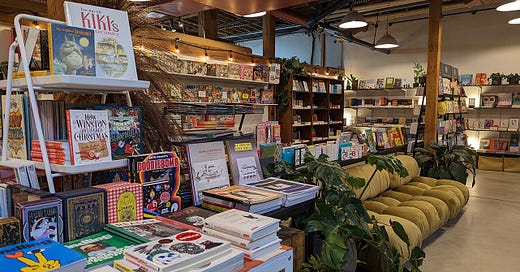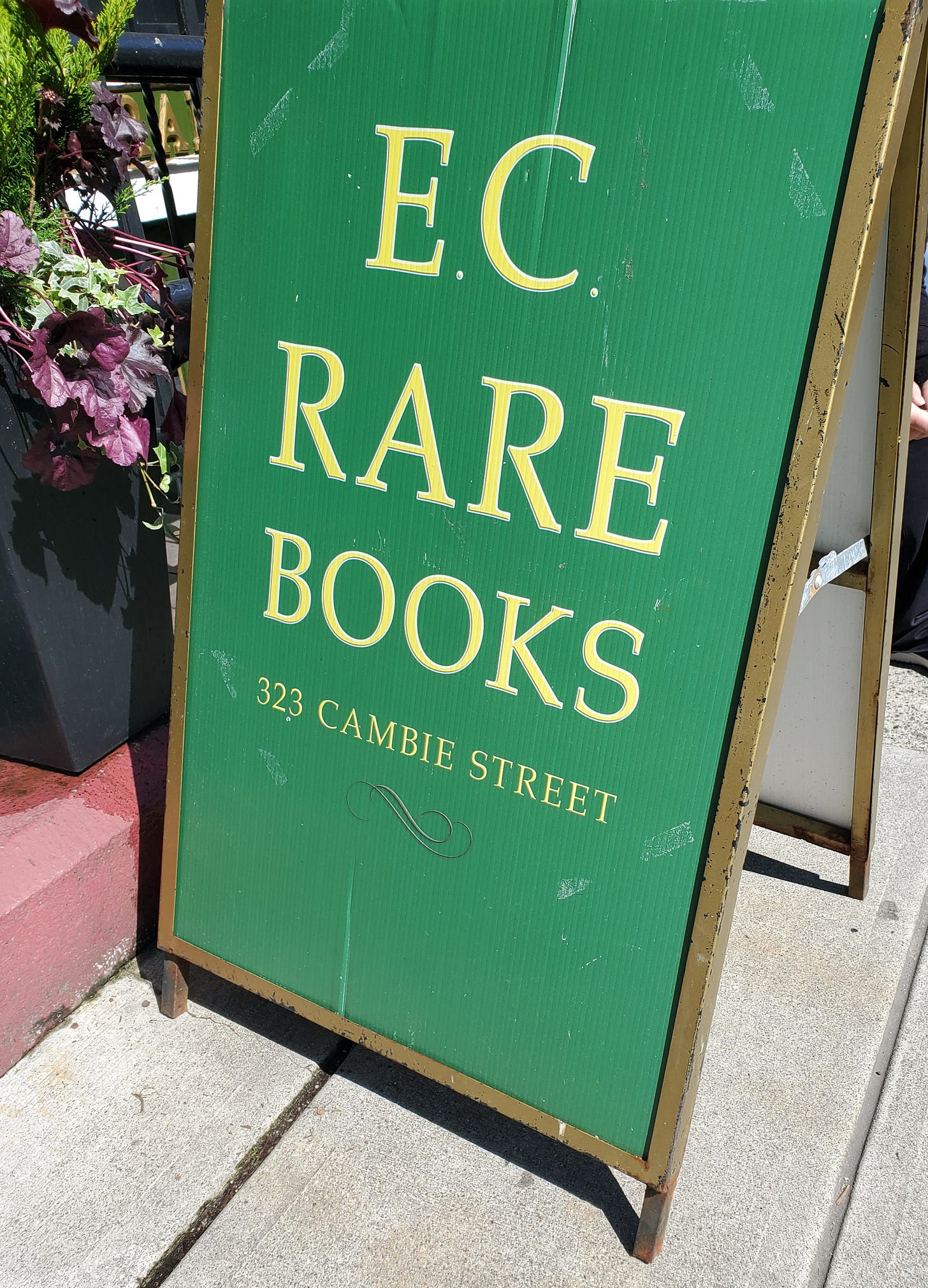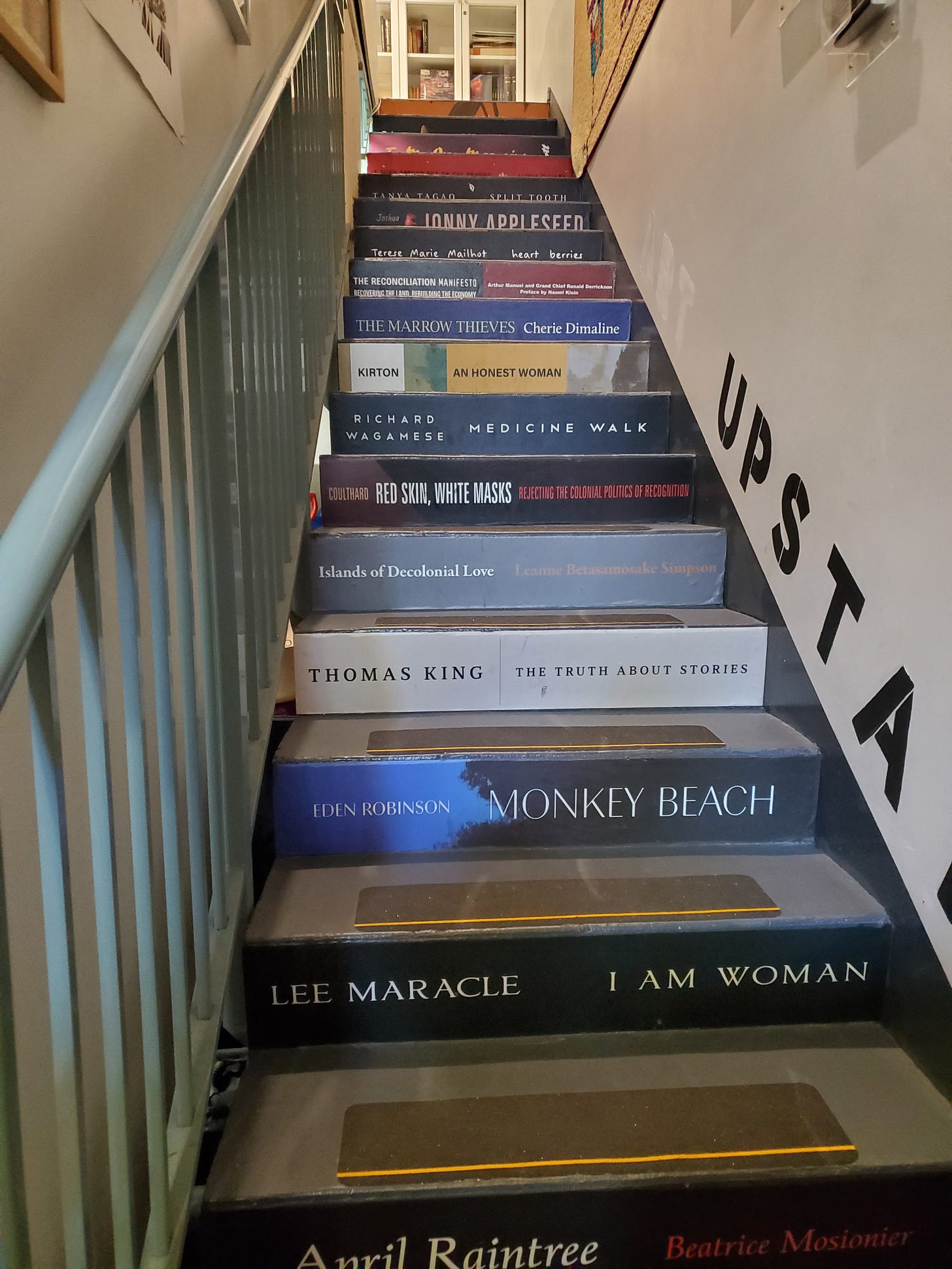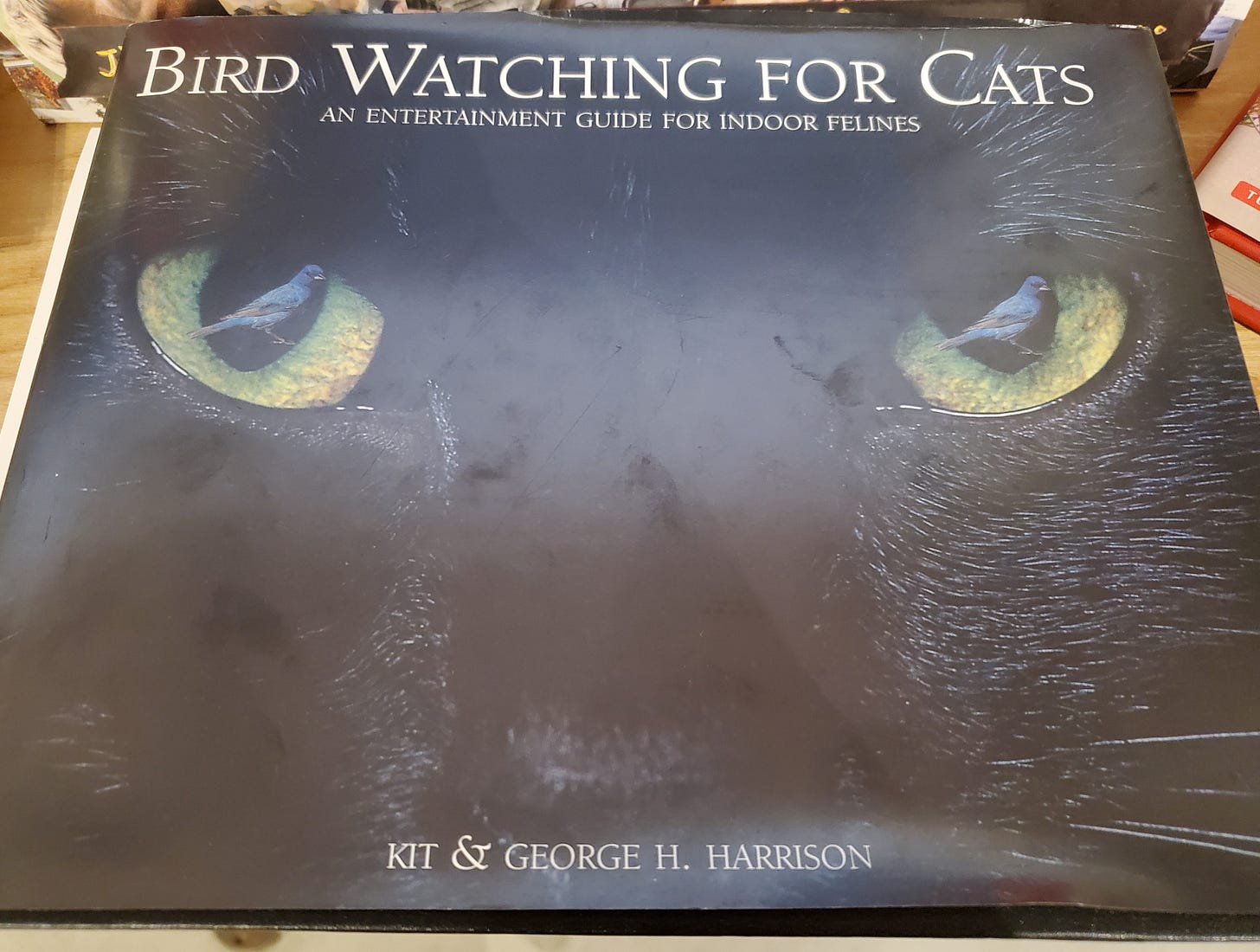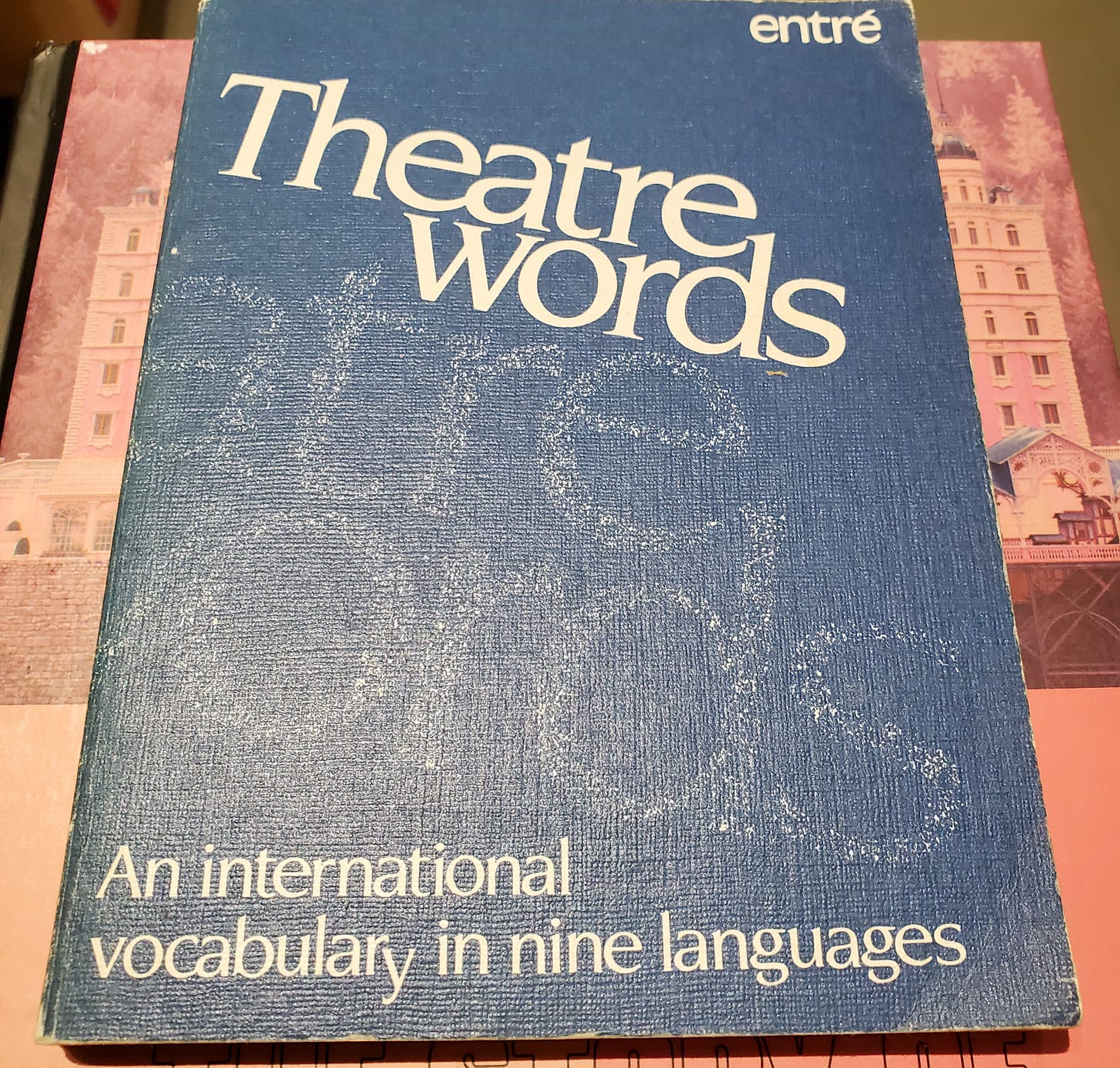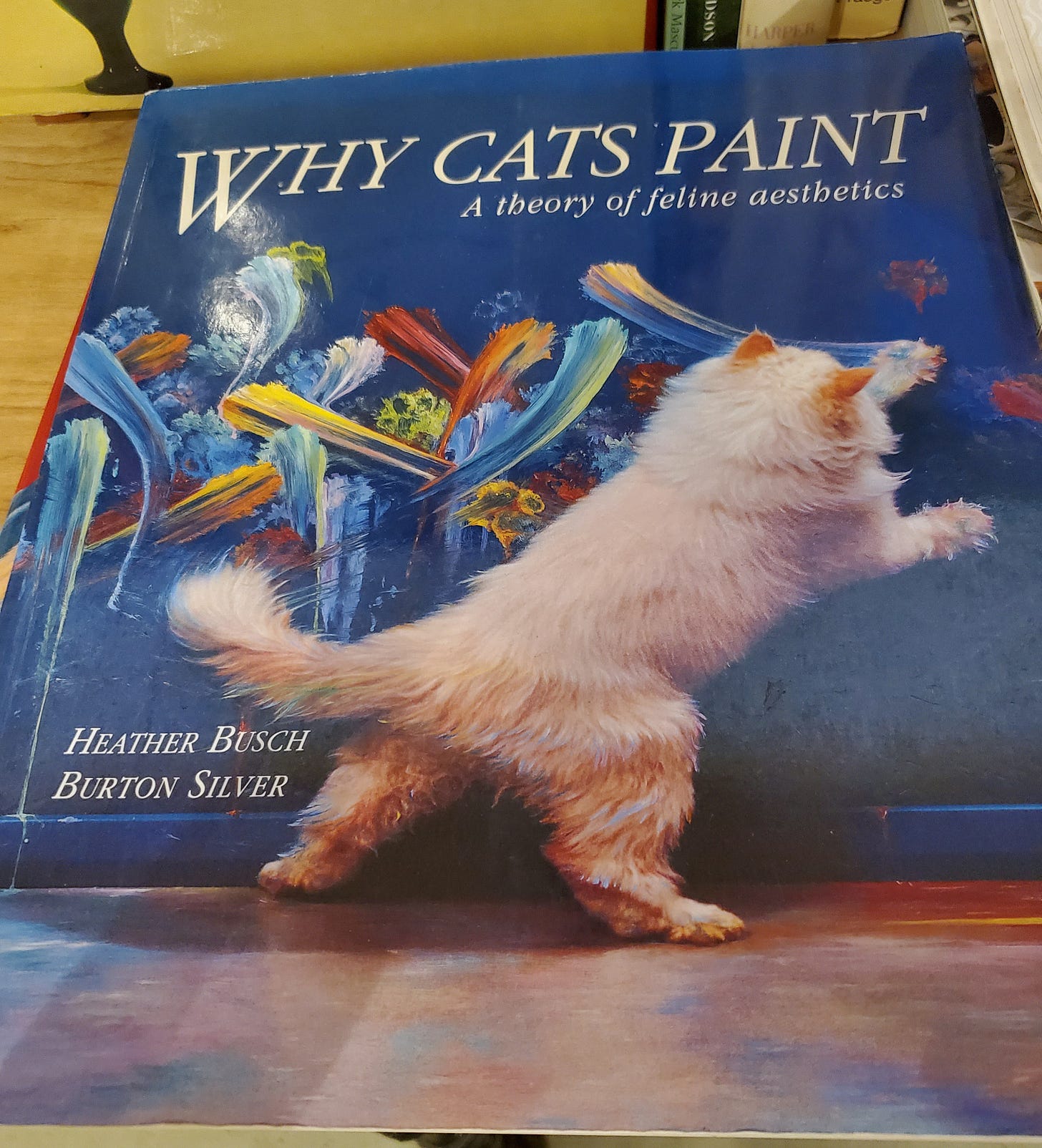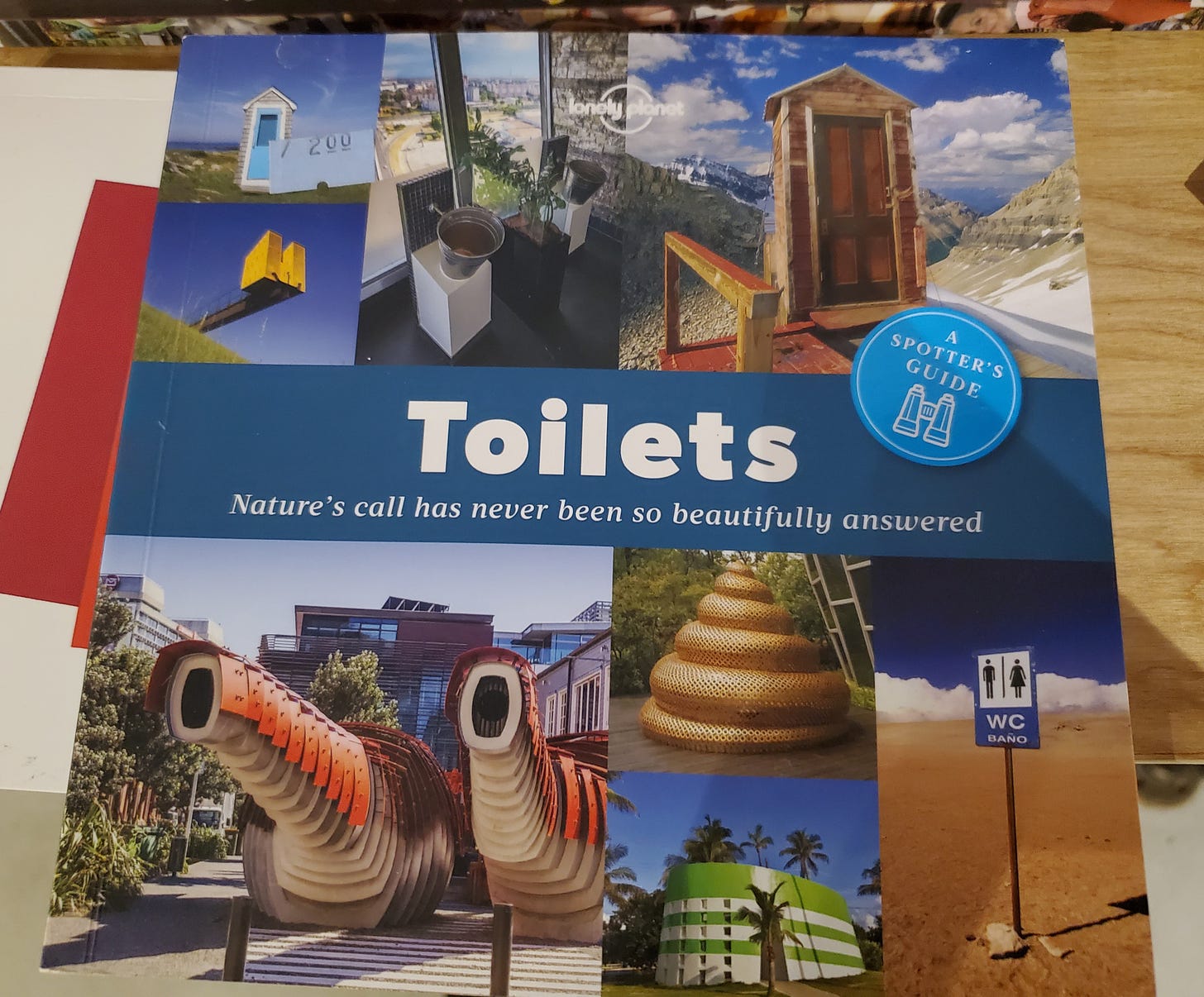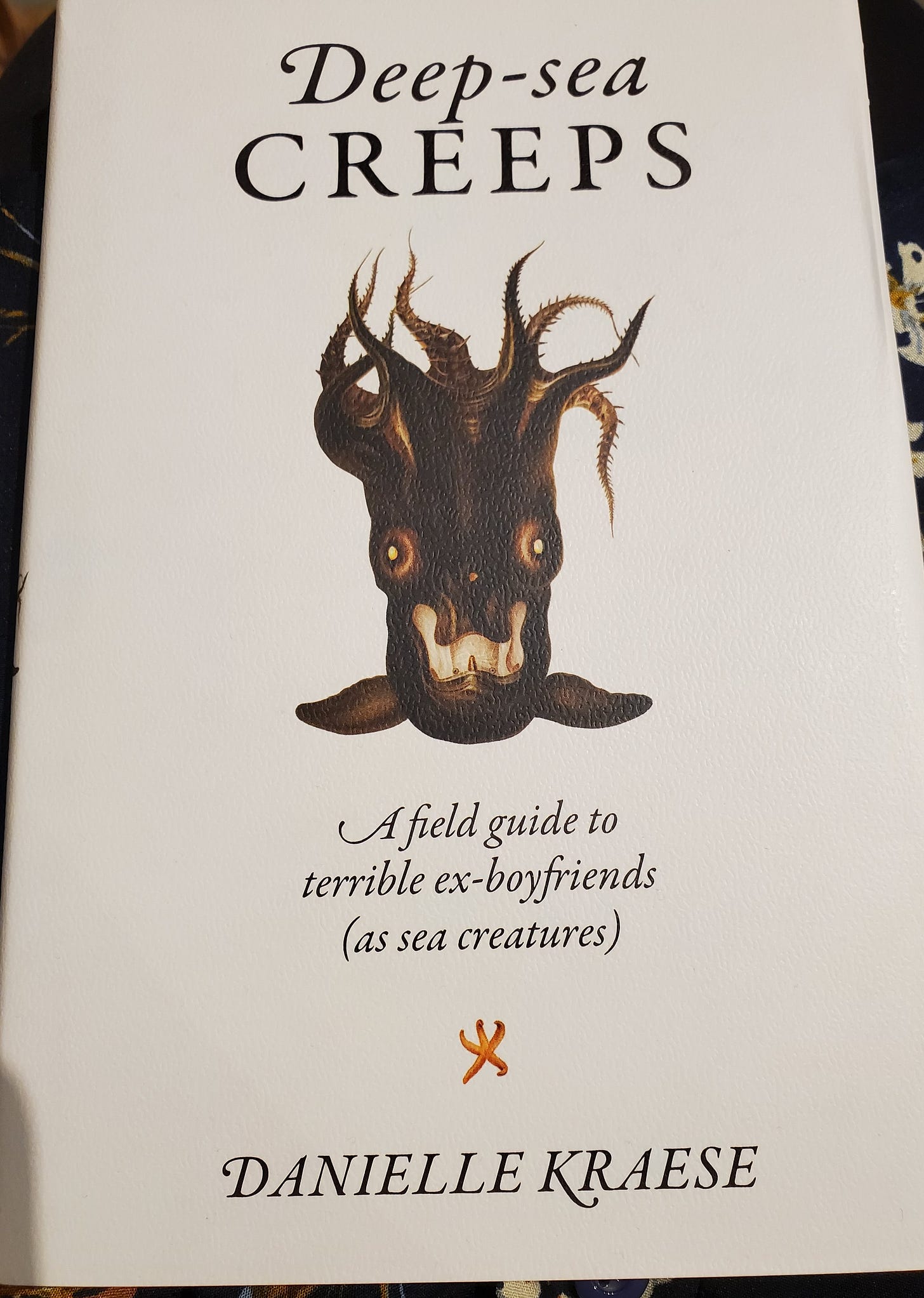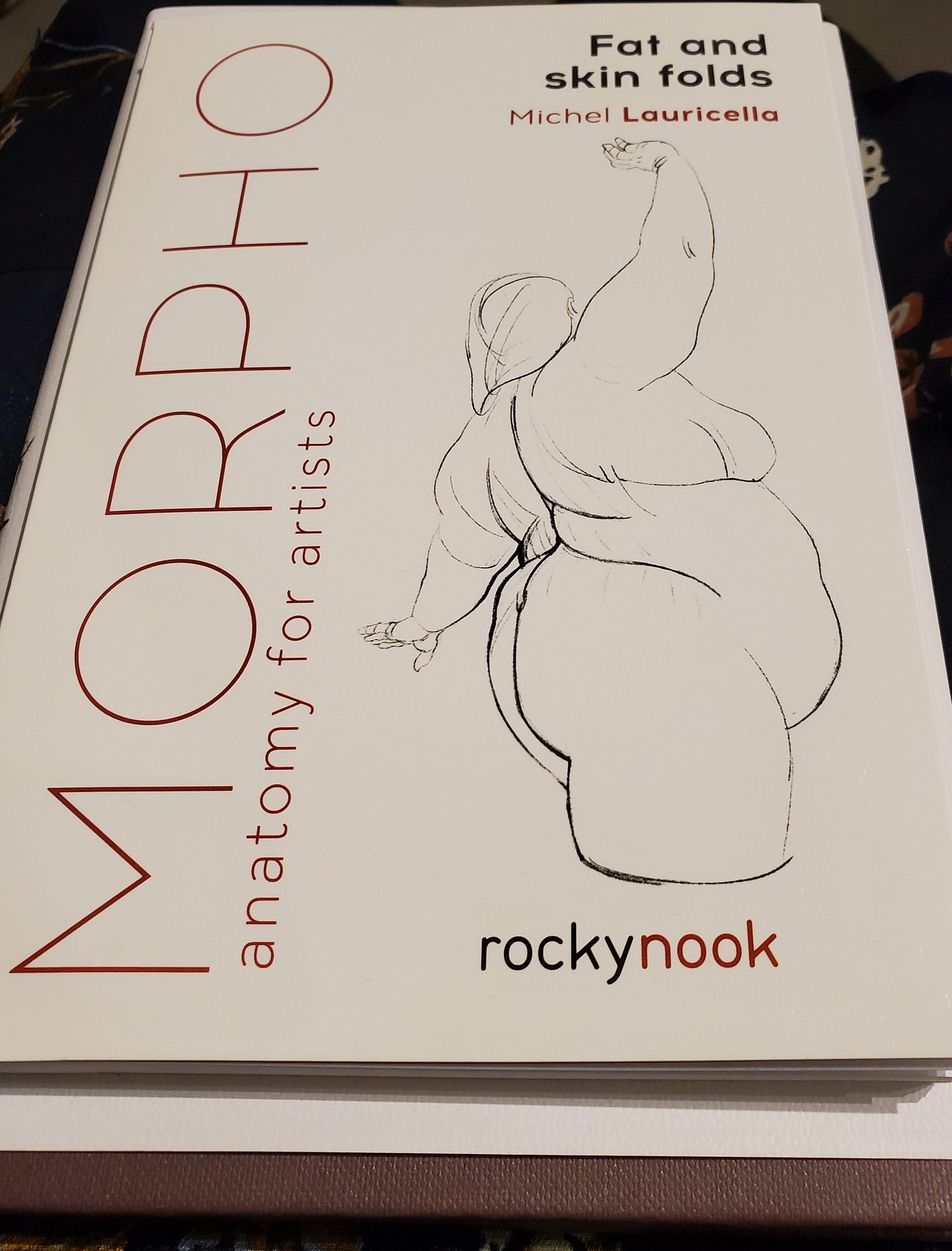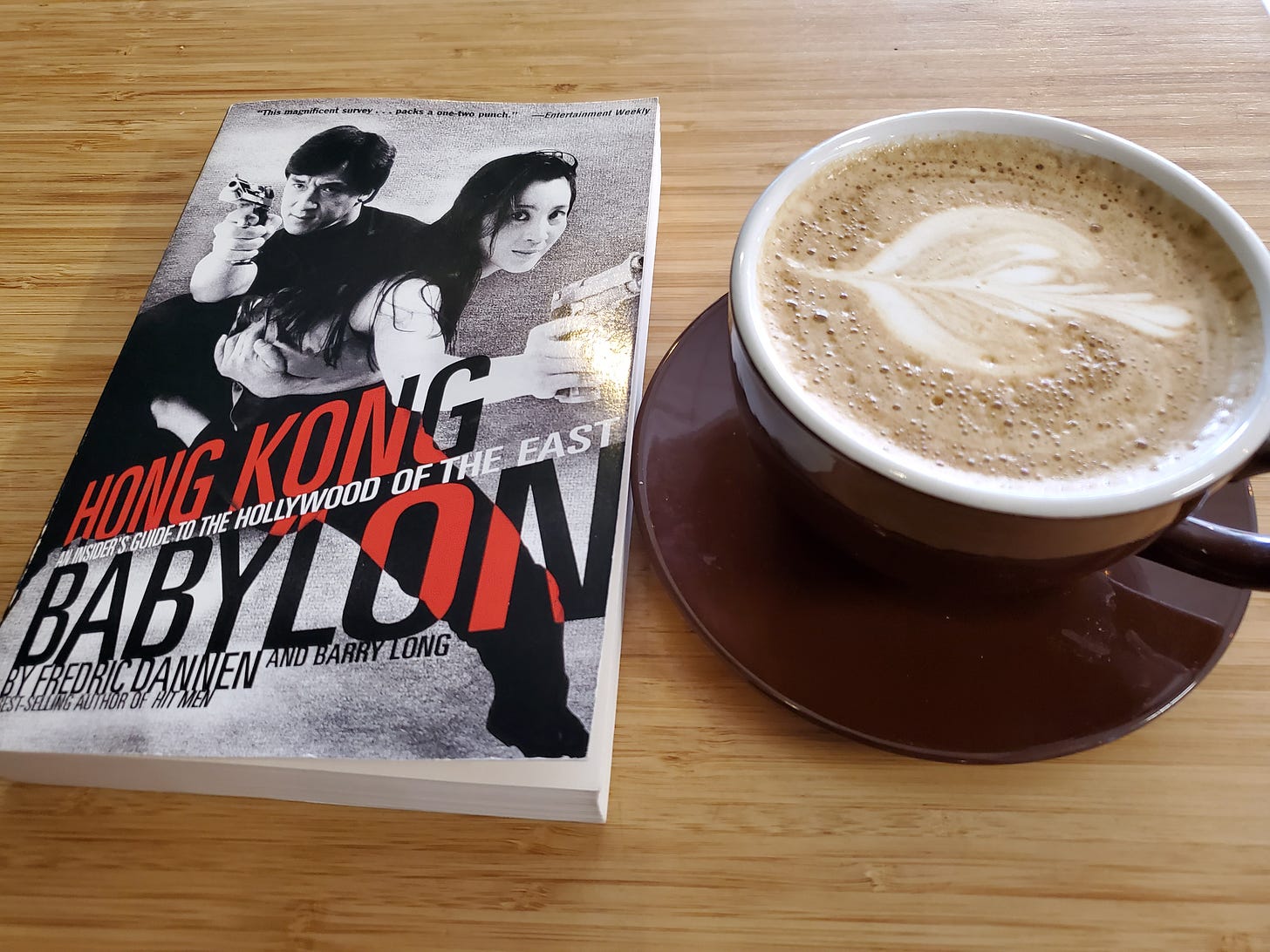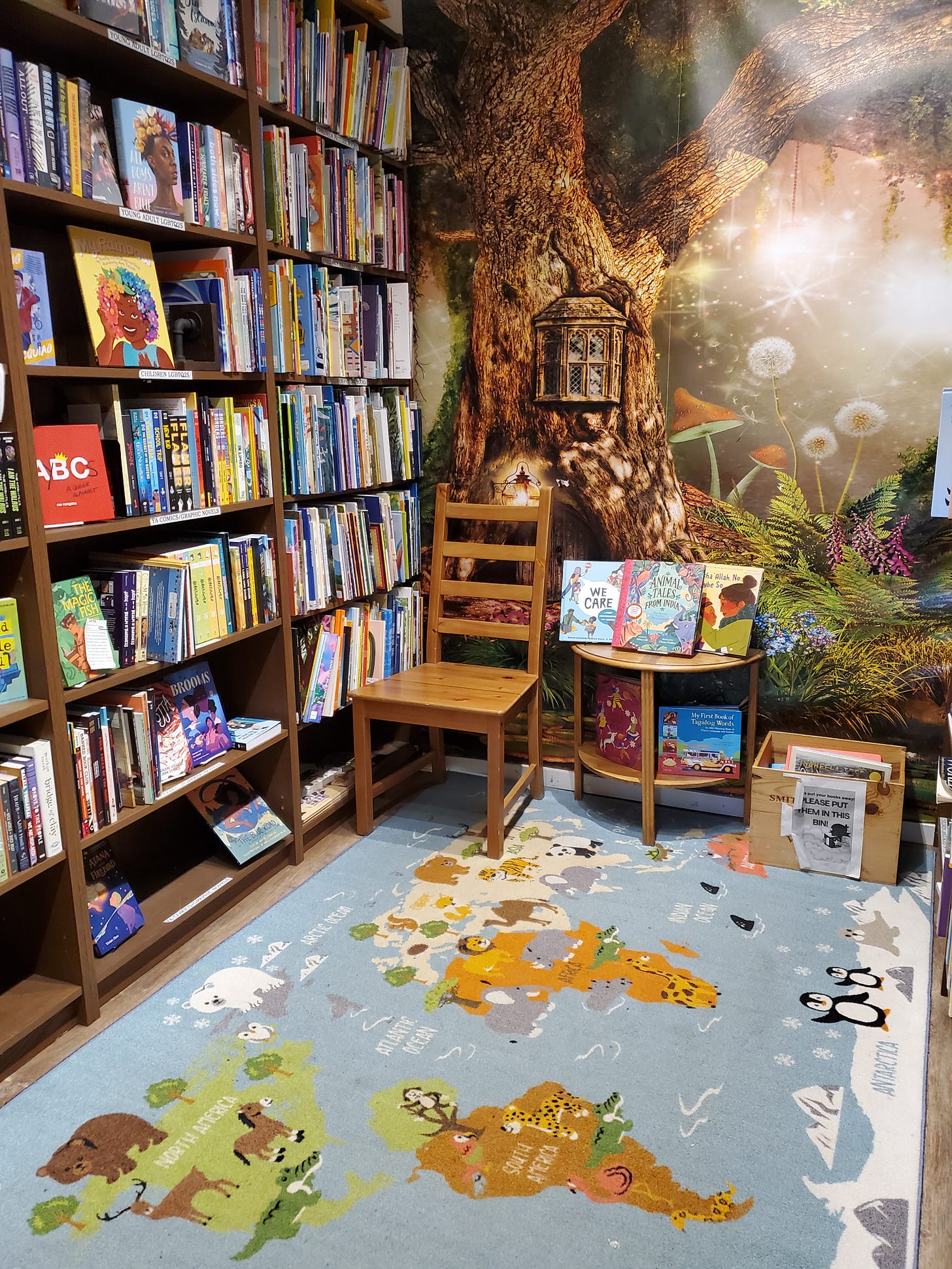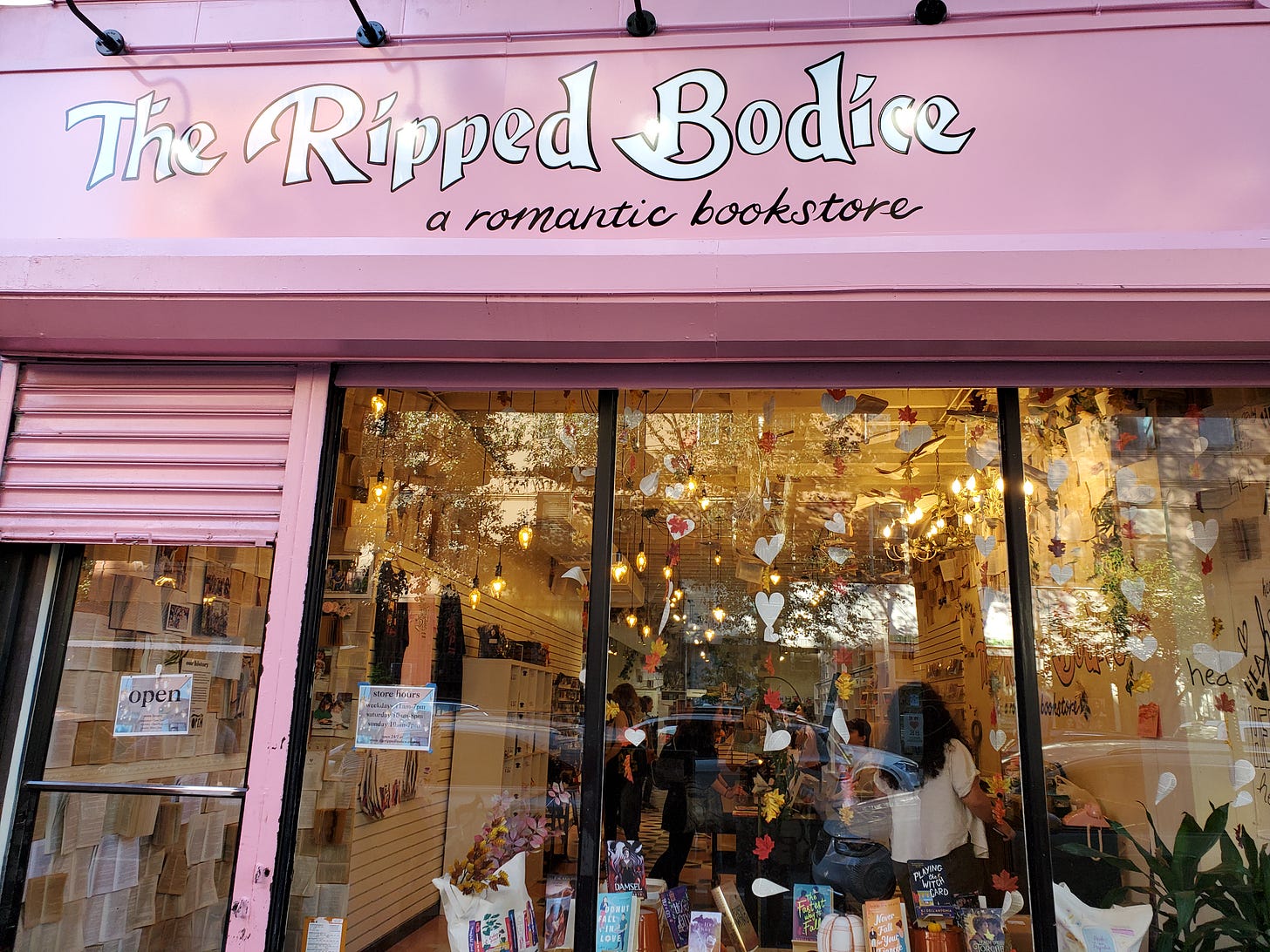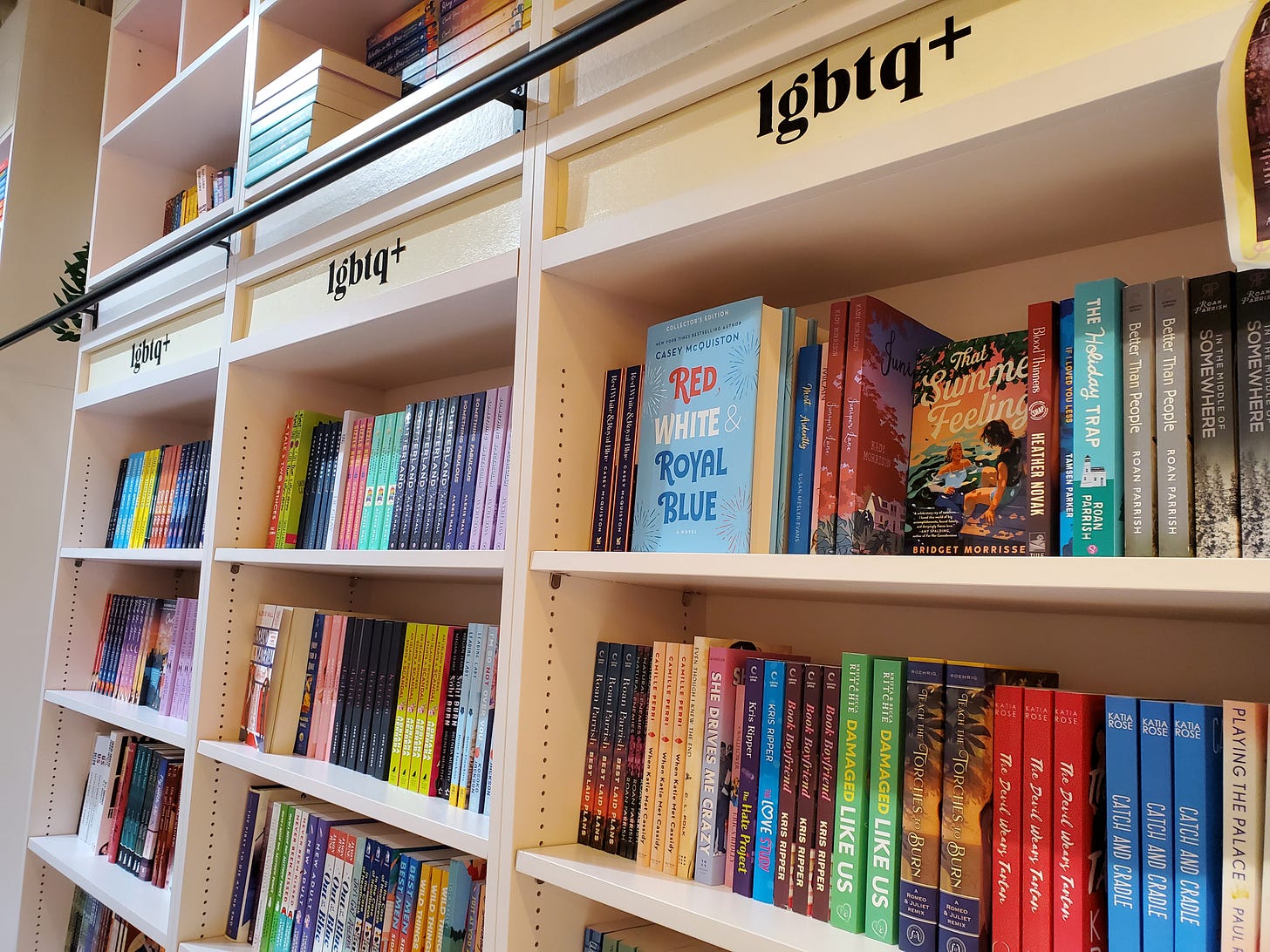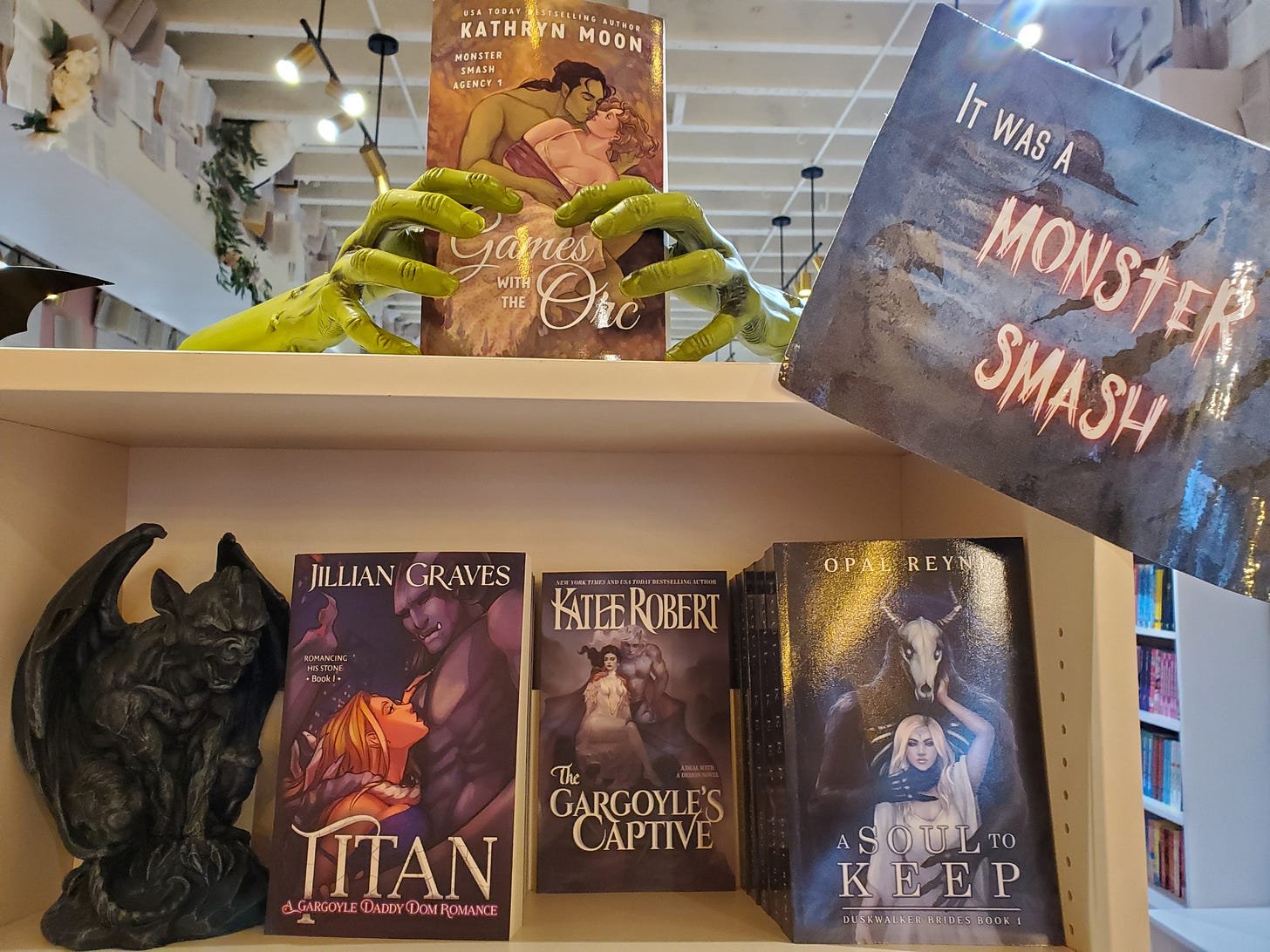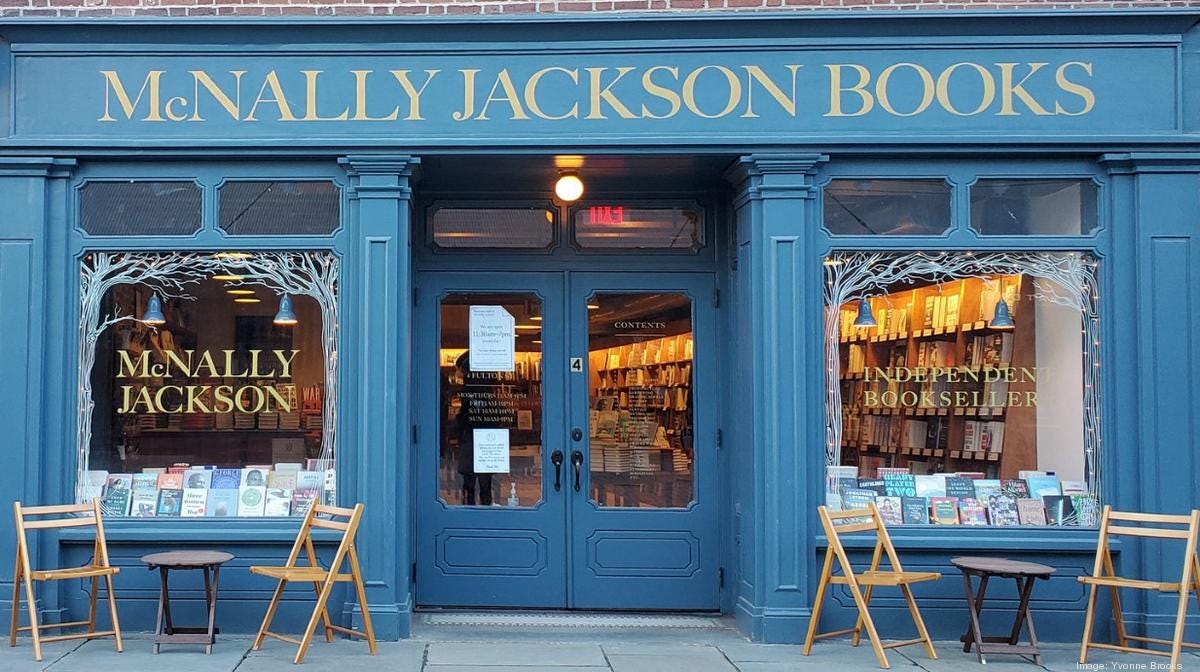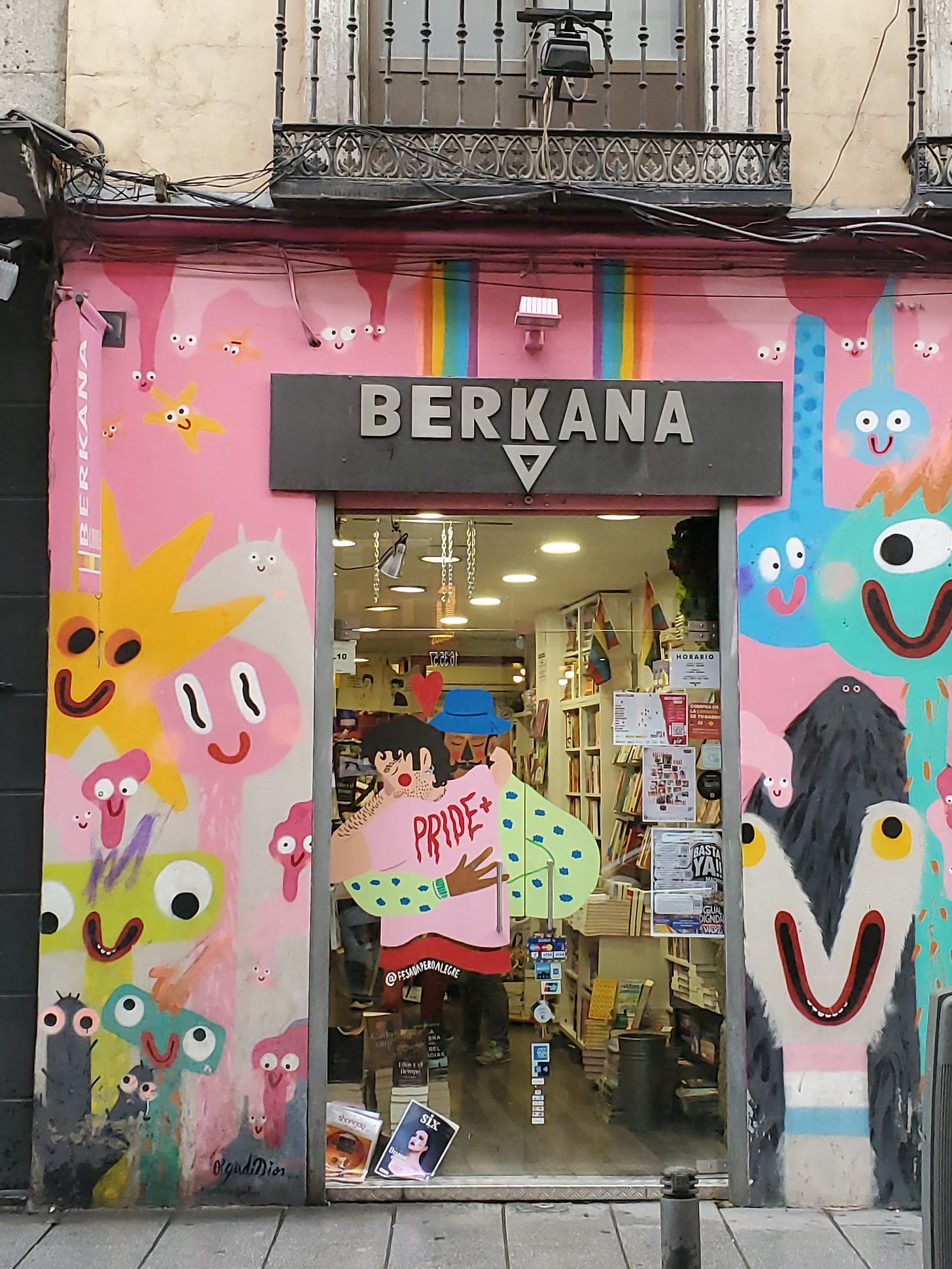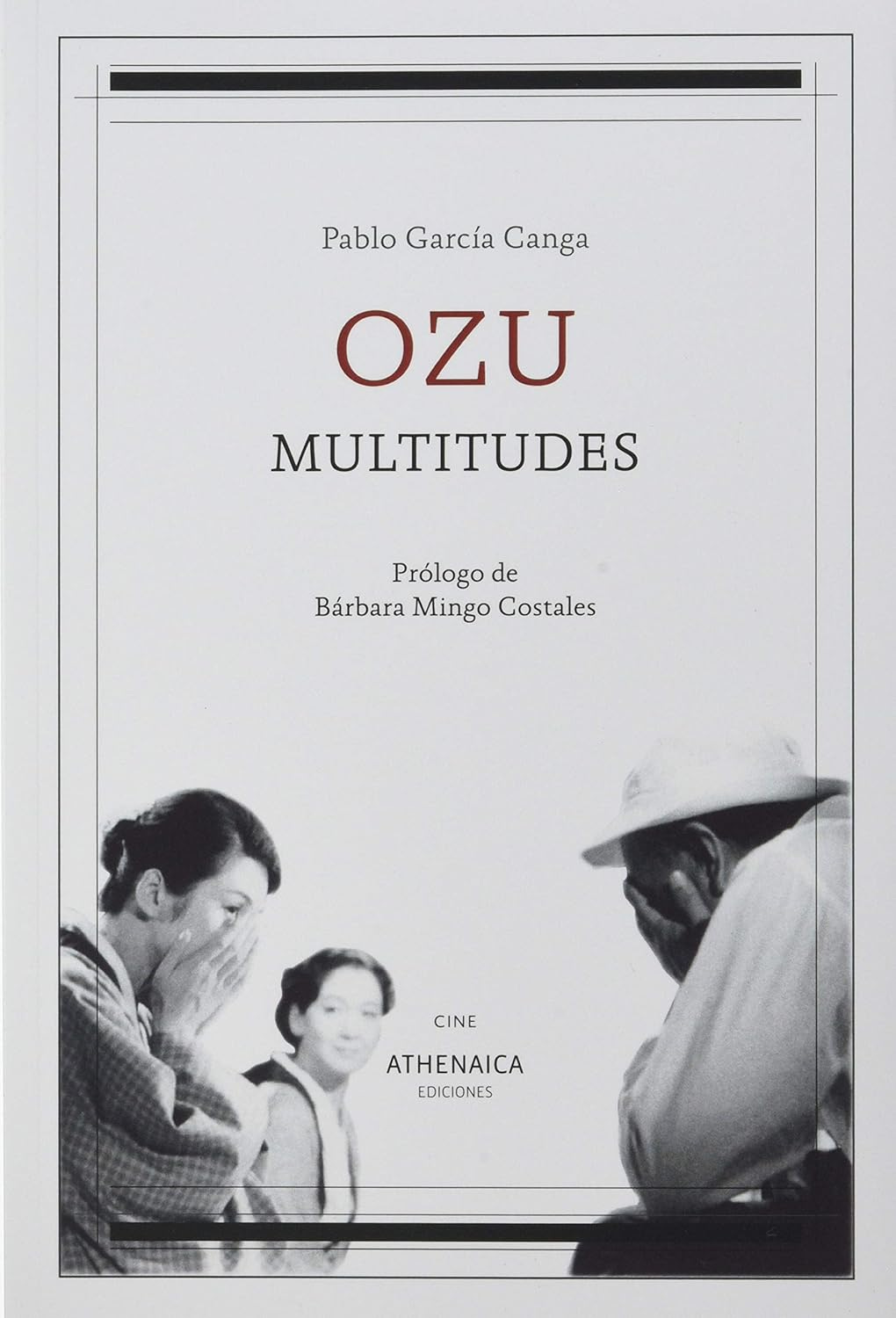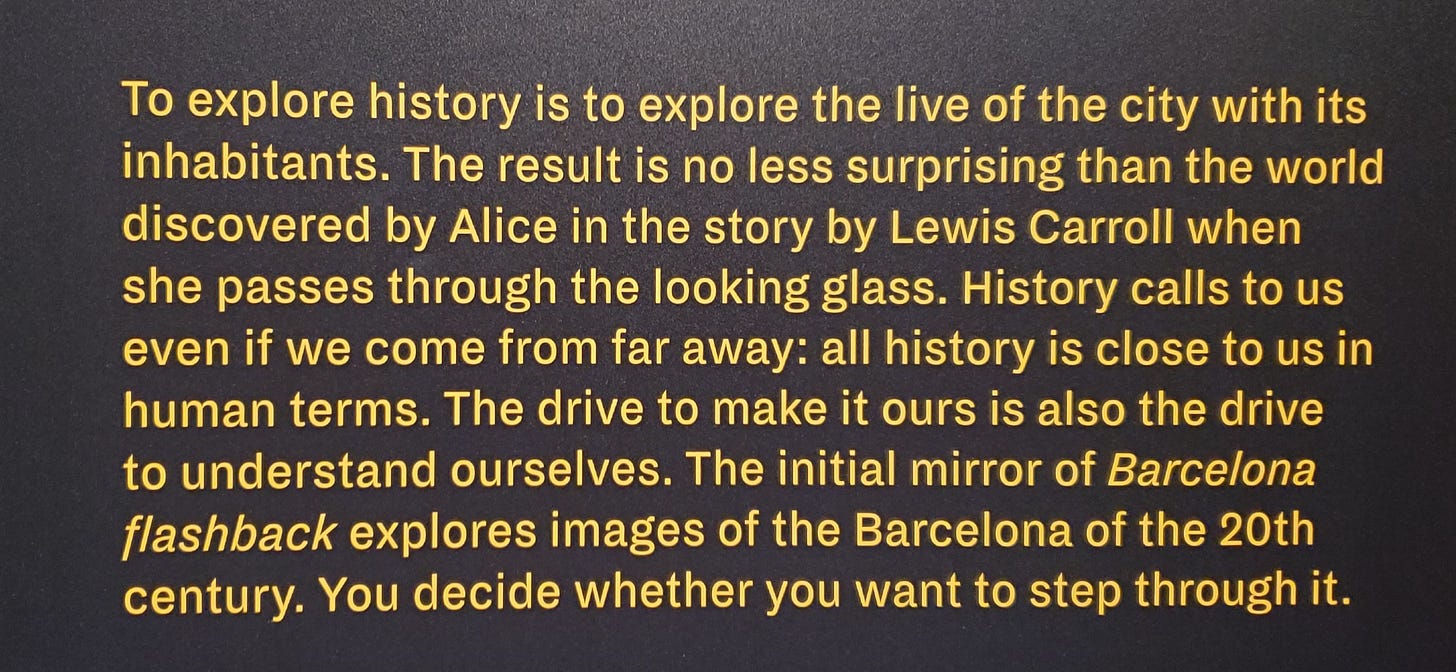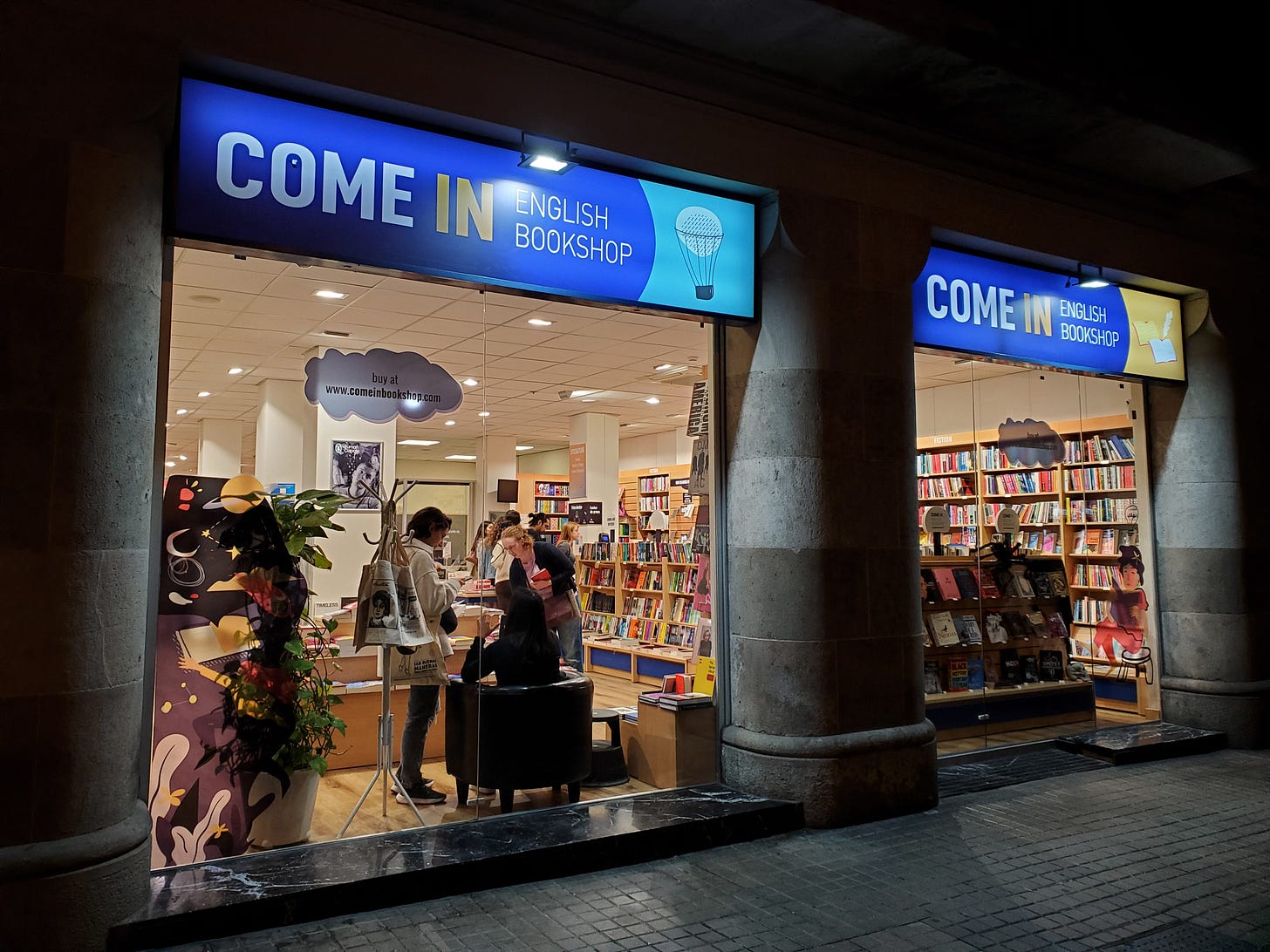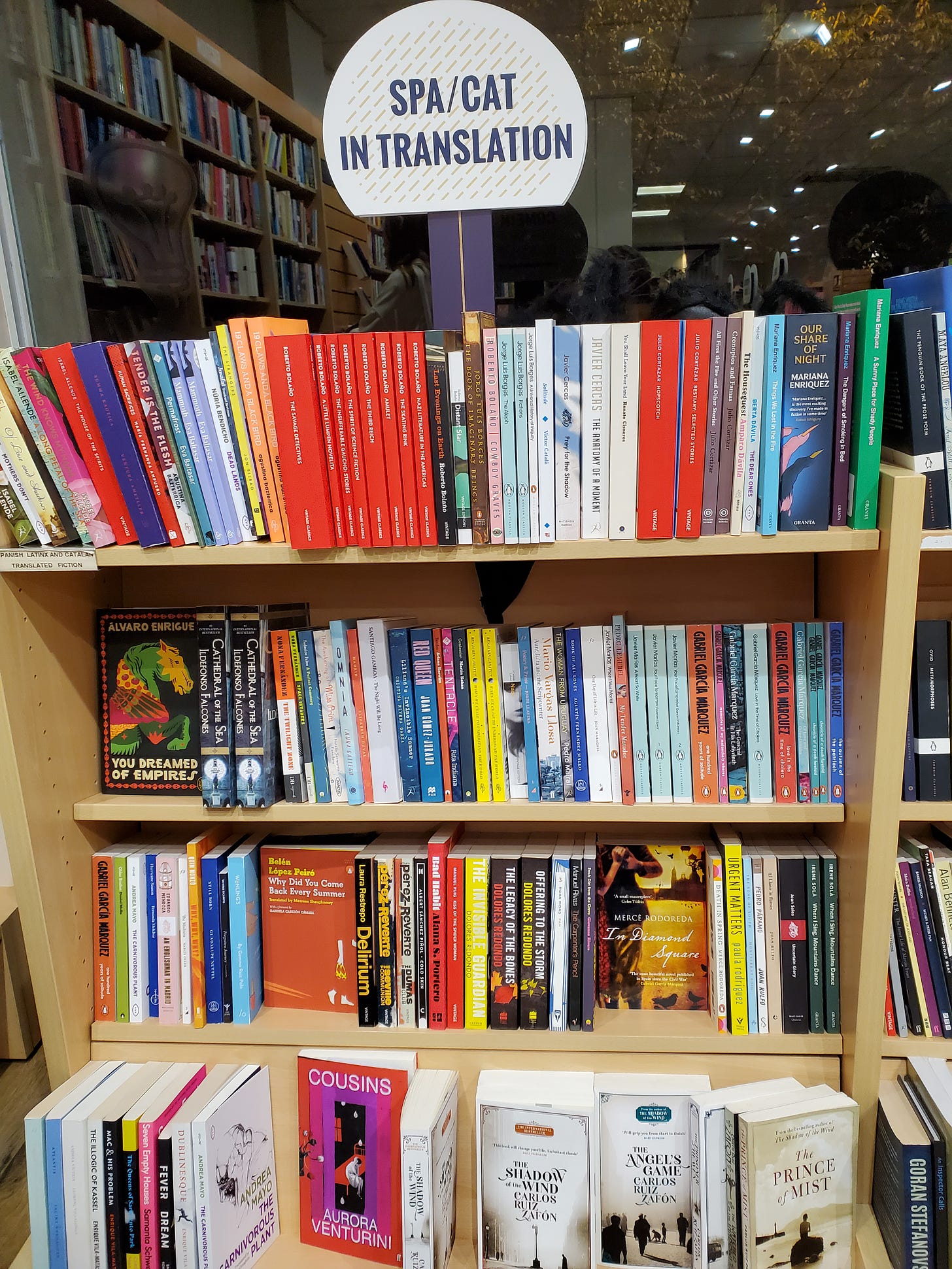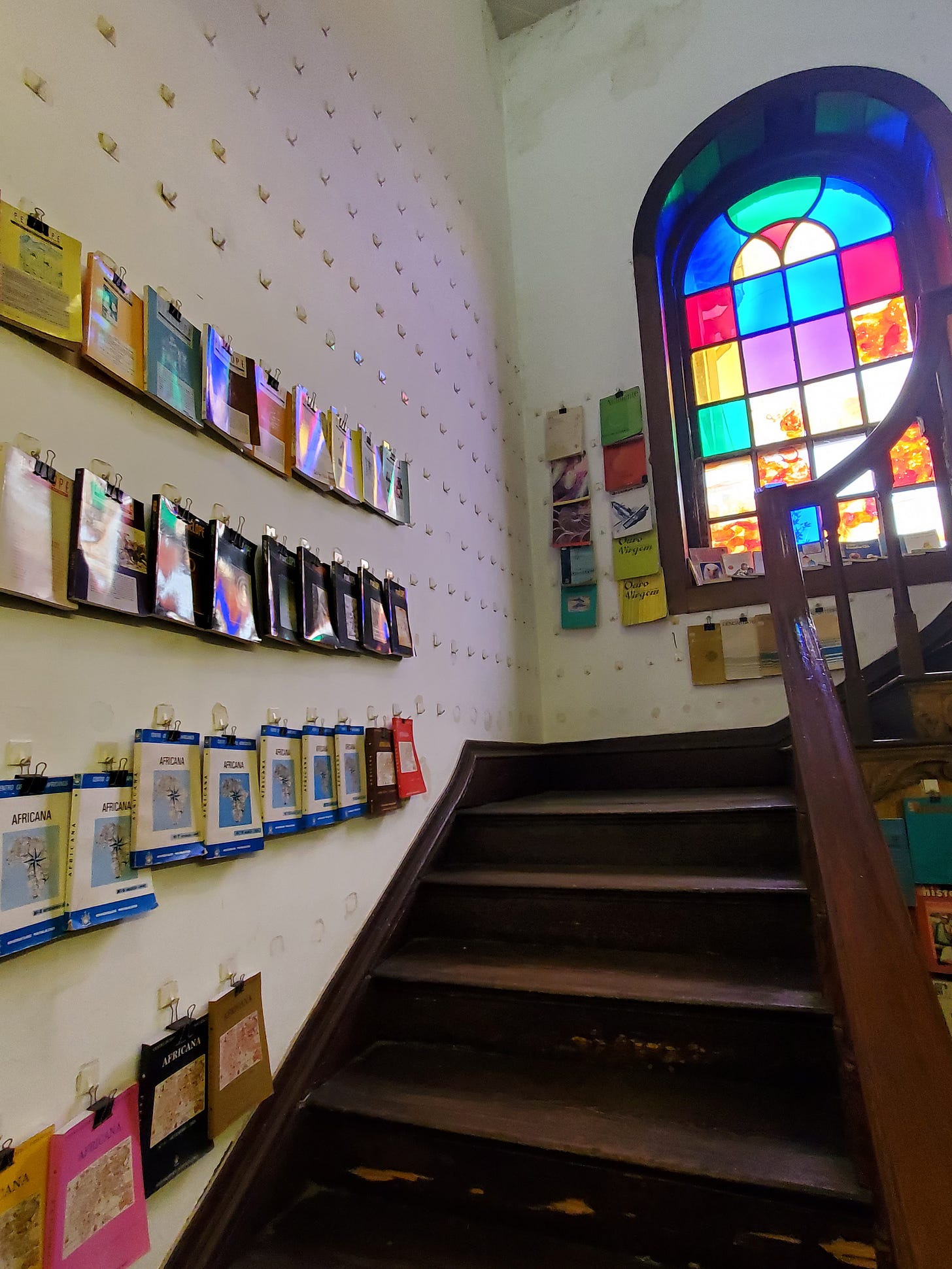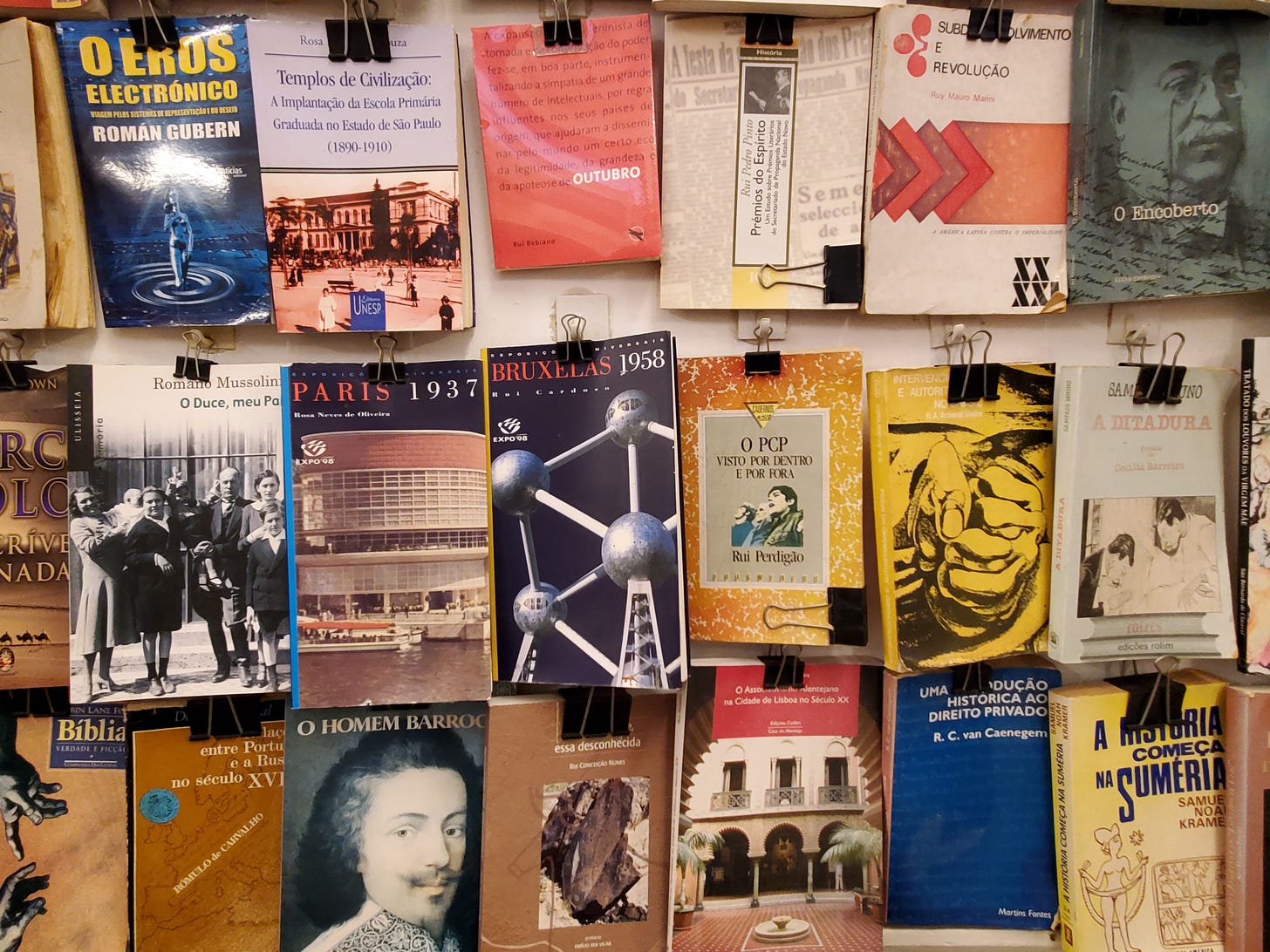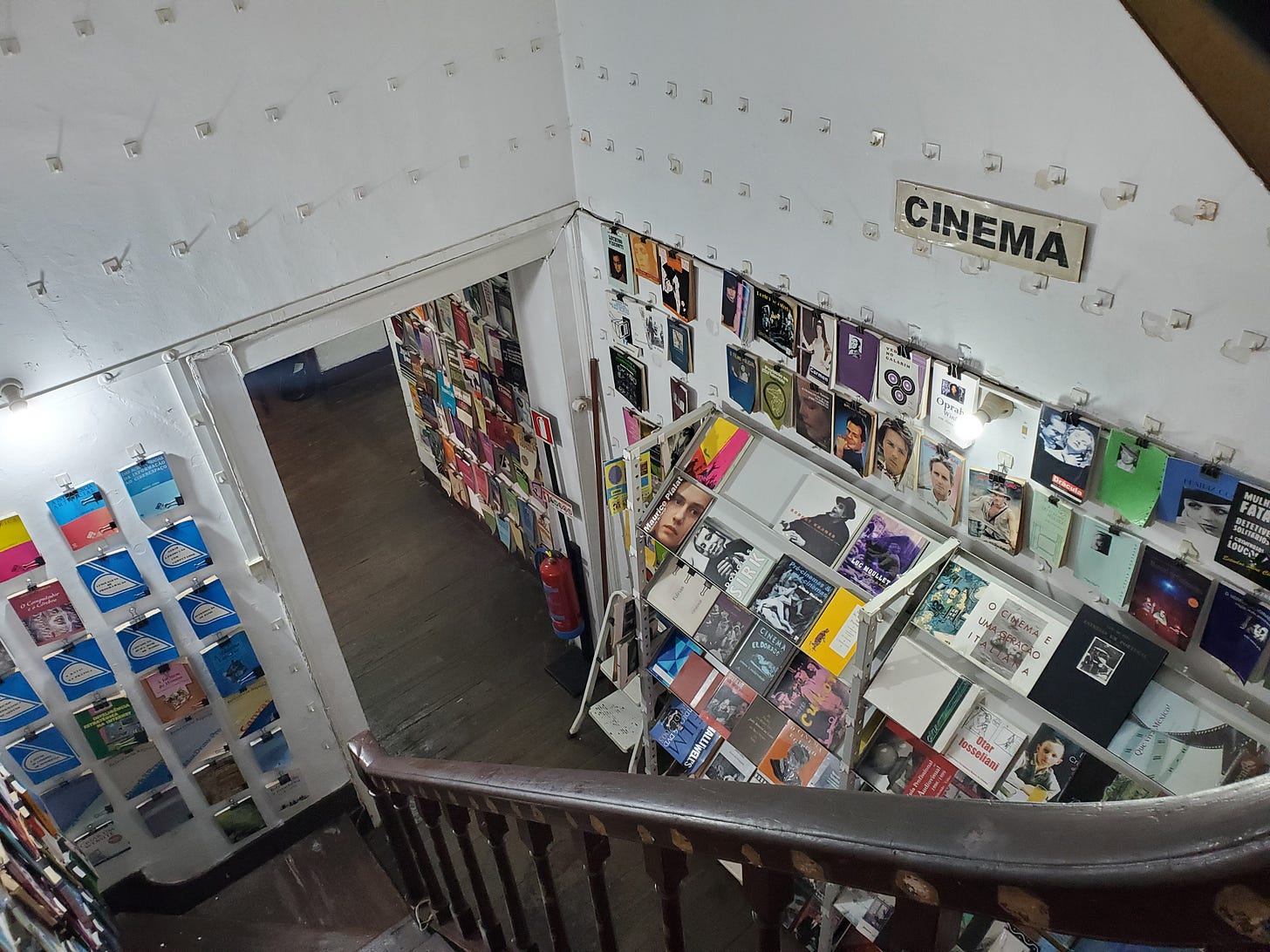The Independent Bookstores I Visited in 2024
11 bookshops across the US, Canada, Spain, and Portugal
One of the great benefits of freelancing is that I get to travel while I work. Subsequently, this year I had the enormous privilege of visiting bookstores in four different countries.
Canada: Vancouver
I spent almost two weeks in Vancouver last spring, much of it book shopping and hiking. It was heartening to see that Vancouverites festoon their city in pride flags, almost to the point of absurdity: Pride colors are pasted onto street signs and park banners, pride stickers plopped over graffiti and lost-cat flyers; pride flags draped over apartment balconies and painted onto stairs, onto crosswalks, onto the cheek of my barista.
Other tidbits I liked: Their definition of a “park” was this New Yorker’s definition of a “whole dang forest.” They had plenty of craft breweries, and I could sip a fresh-from-the-tap beer outside while looking at heron nests in the trees overhead. It was truly dreamy—and, unsurprisingly, their bookstores were just as endearingly quirky as the rest of Vancouver.
Nooroongji Bookstore
Nooroongji is the multilingual bookstore of my dreams. I’ve always imagined a bookstore where I could see books in various writing systems—the Roman alphabet, 한글, 漢字, देवनागरी, ગુજરાતી લિપિ, אָלֶף־בֵּית עִבְרִי, อักษรไทย, الابجدية—all on the same shelves. My dream came true! Nooroongji has a beautiful curation of literature from all around the world, much in-translation and much not.
The bookstore’s owner, Jennifer Kim, explains the store’s name here:
‘Nooroongji’ or ‘nurungji’ is the Korean word for the scorched bits that coalesce at the bottom of a pot of rice. In Korean cuisine, that crunchy layer can be repurposed into a snack, dessert, tea or soup. “I discovered that all sorts of different cultures have their own word for this,” she says. “It’s all about finding commonalities across differences and also the silver lining in any situation.”
At Kim’s store, I found gorgeous illustrated books on the Ramayana and Mahabharata. You can see the former in this video:
It was an unwise endeavor to lug these heavy tomes home, but when I later spent my midnights curled up with them in bed, it was more than worth it.
E.C. Rare Books
Although this bookstore was beyond my budget, I greatly appreciated the selection of antique books they had and their tolerance for extended browsing:
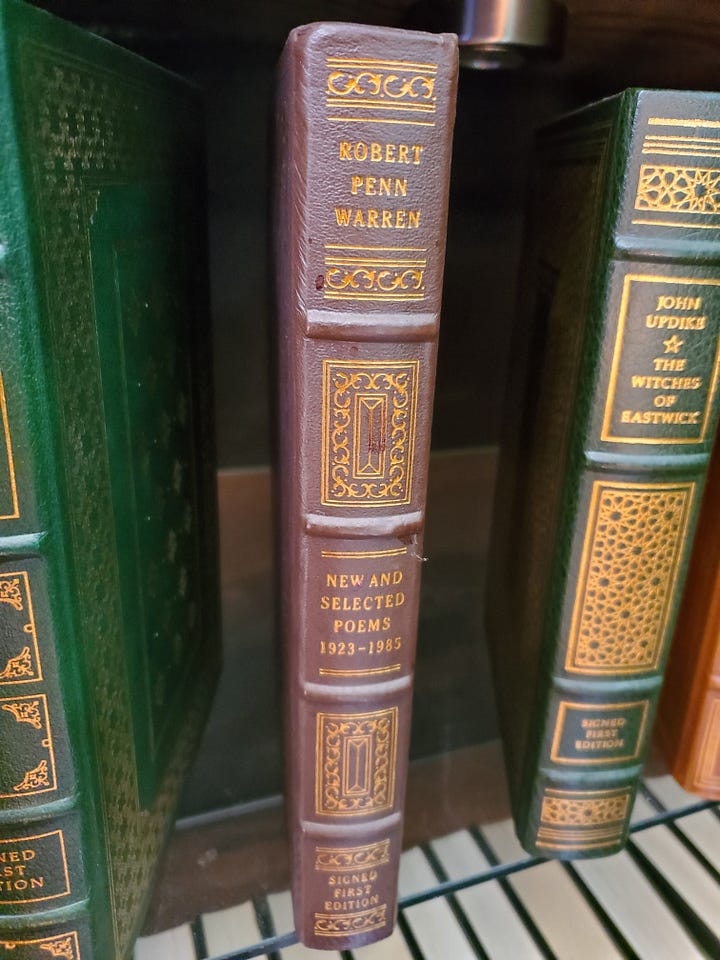
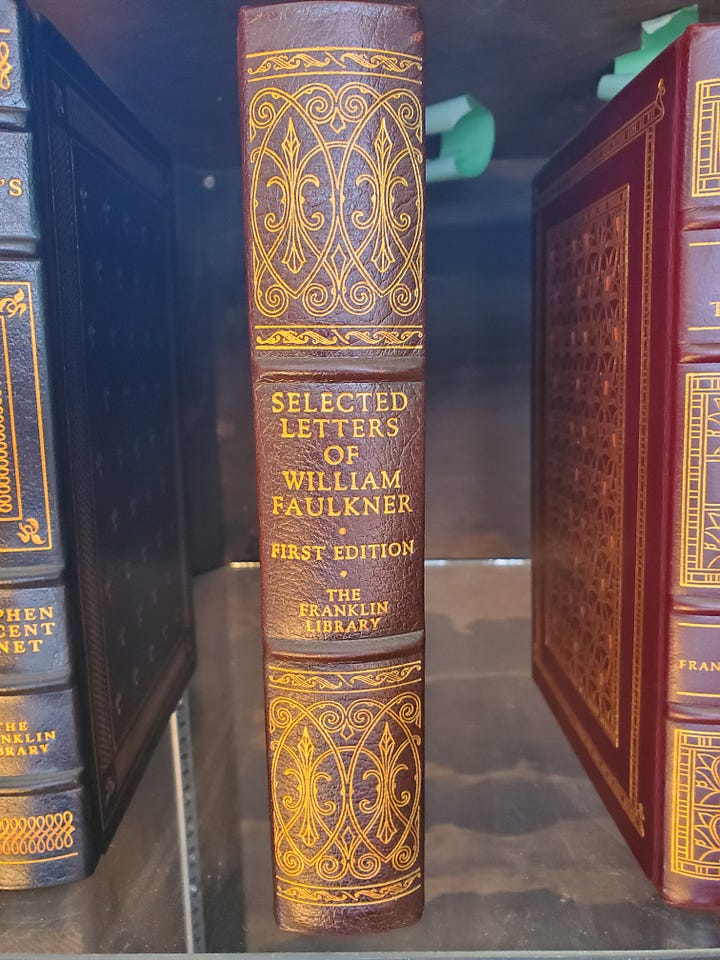
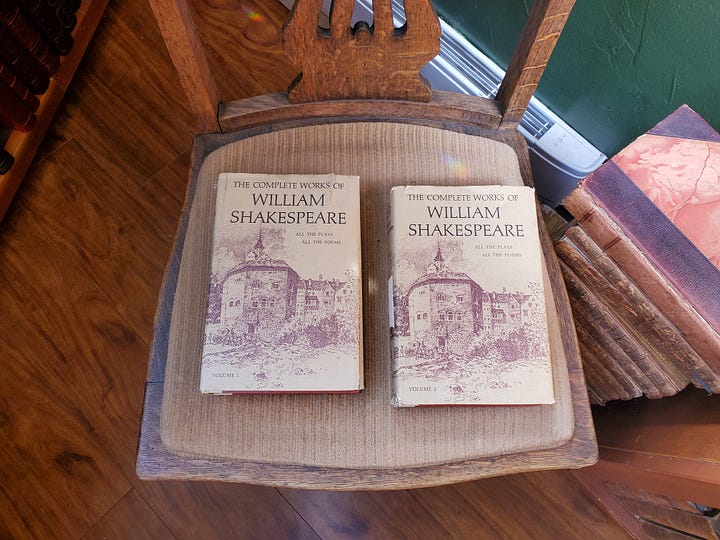
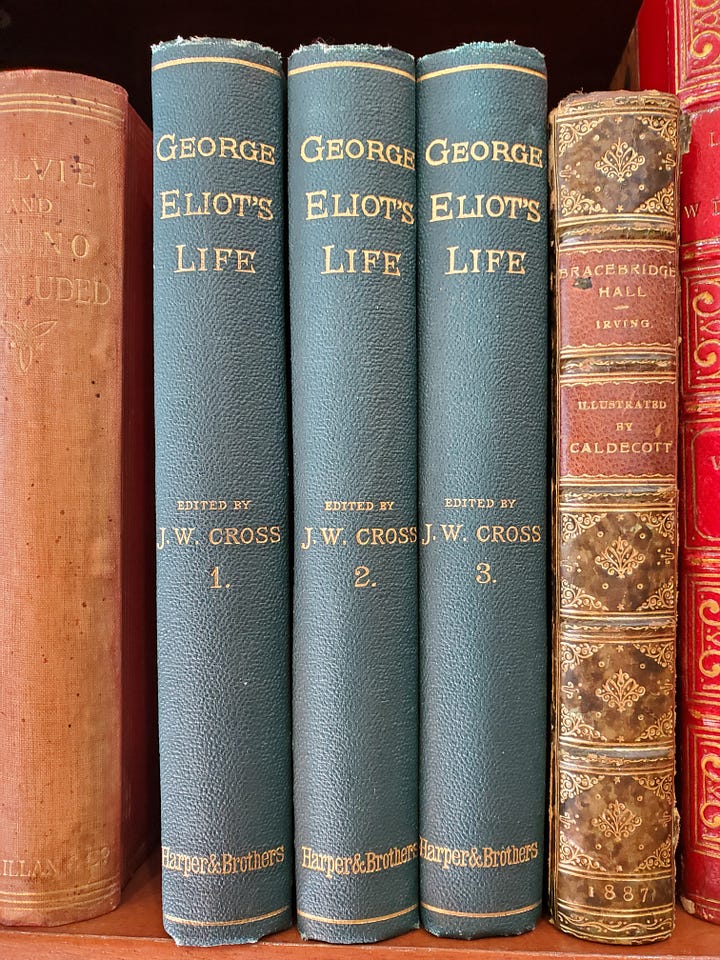
Massy Bookstore
Massy is a used bookstore that might remind New Yorkers of Bluestockings or Washingtonians of Politics & Prose. In addition to their books on social justice, they had many very unique titles:
I ended up in the cinema studies section, and I got Colors of Film: The Story of Cinema in 50 Palettes by Charles Bramesco and Hong Kong Babylon: An Insiders Guide to the Hollywood of the East by Fredric Dannen and Barry Long. I highly recommend them both—the former because it’s a beautiful musing on cinematography and the latter because it is absolutely wild. (Did you know the original martial arts films were mostly funded by gangsters?! That stuntmen were paid peanuts to throw themselves out of skyscrapers with nothing but cardboard boxes waiting for them on the ground? And that legend Michelle Yeoh, now of Everything Everywhere All At Once fame, was once virtually the only actress in China capable of doing her own stunts?)
And finally, they had a sweet little children’s nook:
US: NYC
In August 2023, the Ripped Bodice bookstore, a sister-owned, romance-only indie shop in LA, expanded into Brooklyn. It’s been my great pleasure to frequent there ever since.
I appreciate their sizable LGBTQ+ section:
And that they stock indie authors and uber-niche romances you won’t find in other stores:
Across the bridge in Manhattan, I also enjoyed exploring the specialized curation of the Tenement Museum gift shop. I wrote about that here.
And McNally Jackson’s Seaport location (est. 2019) still feels new to me. I love that there’s this beautiful bookstore crammed with global literature right on the water now:
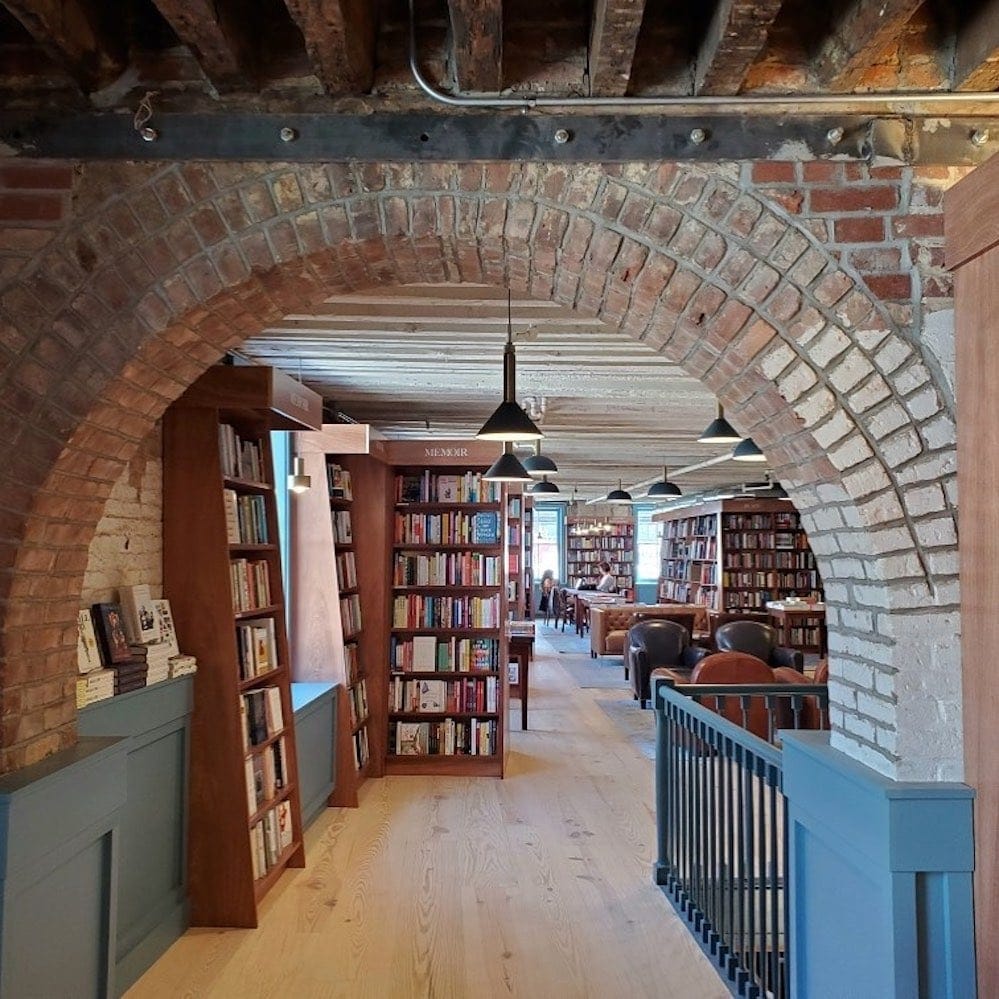
I wrote about meeting one of my favorite authors at McNally Jackson here.
Spain
Madrid
I visited Madrid for the first time this year and promptly fell in love. It has no business being as beautiful as it is, and it was reassuring to me that the young people there still dress just the same as I did when I lived in Europe about a decade ago (think: black; think: peacoats). As an American, things I found charming included: someone made me a fresh crepe at the movie theatre concession stand, it was perfectly natural to have a glass of sparkling cava at lunchtime, and one day I spontaneously visited a church and stumbled upon a Caravaggio casually hung in a corner. Madrid, to me, feels fantastical in its sheer plenty.
Berkana
I found two queer bookstores in Madrid (one of which was closed when I visited, but I’ll share pictures of it below).
Berkana was small but mighty, featuring tons of books, comics, manga, magazines, and movies. There were trendy romance novels and locally published history books about what it was like to be gay under the Franco regime; the whole spectrum (of queerness, of literature) was covered in the shop’s cozy space.
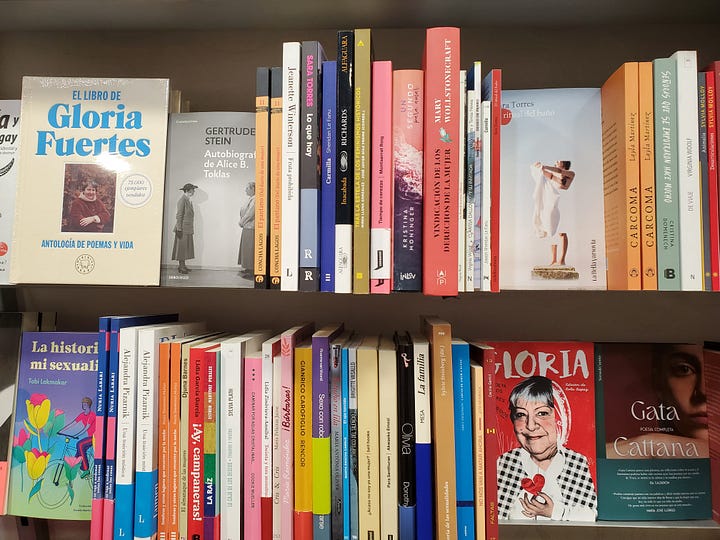
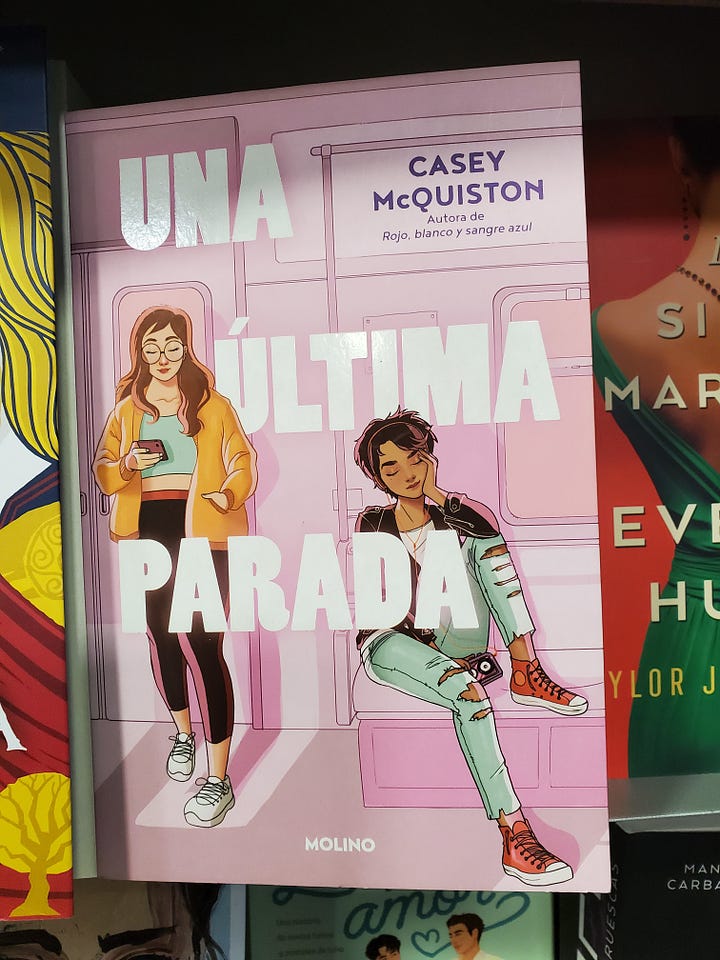
Here’s a bit about the store’s history from this article:
In the heart of the bustling neighbourhood of Chueca sits the LGBTQ+ institution of Librería Berkana – Madrid’s oldest LGBTQ+ bookshop, which first opened its doors in 1993. After struggling for a number of years with her identity as a lesbian woman, founder Mili Hernández credits the discovery of LGBTQ+ bookstores in New York and London with “saving her life” and giving her the tools and information to understand and embrace herself. “Discovering these books and literature helped me deconstruct myself as a heterosexual woman and build myself up as a lesbian woman” explains Mili. “After living abroad, I decided to return to Spain and pay a sort of ‘homage’ to these two bookshops from elsewhere in the world and bring what I had experienced to other people.”
Chueca in the early 90s was a very different place to what it is today. There were fewer safe spaces for the LGBTQ+ community back then, and the majority of LGBTQ+ businesses such as bars and discos were only open at night. Berkana gave the community somewhere to be visible and safe during the day. “My bookshop was the first business open for gays, lesbians and transsexuals during the day” says Mili. “Berkana was the embryo of what became the gay neighbourhood of Chueca and it completely shook up the conception that people had of hidden and obscure homosexuality.”
Hernández was at the shop while I was browsing, and she was extremely kind.
I passed this second LGBTQ+ bookstore as well:
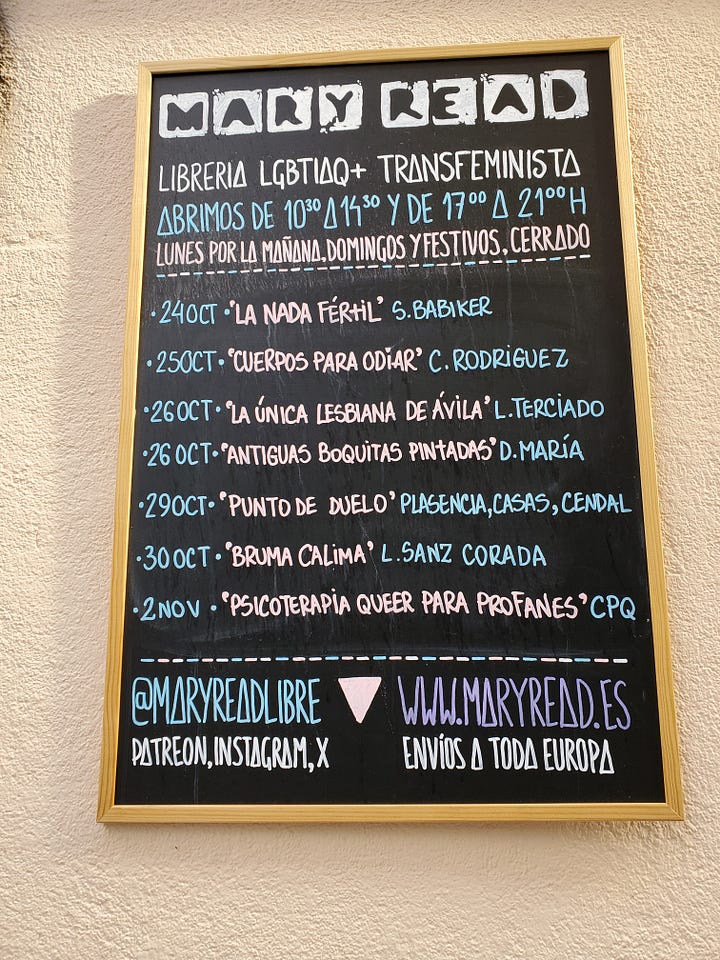

Librería Antonio Machado
My understanding is that this indie bookstore, which I found while walking somewhere else, was an important gathering space for intellectuals when Franco ruled over Spain. Today, its antifascist roots are still readily apparent in its wide selection of books on antifascism, anticolonialism, et cetera.
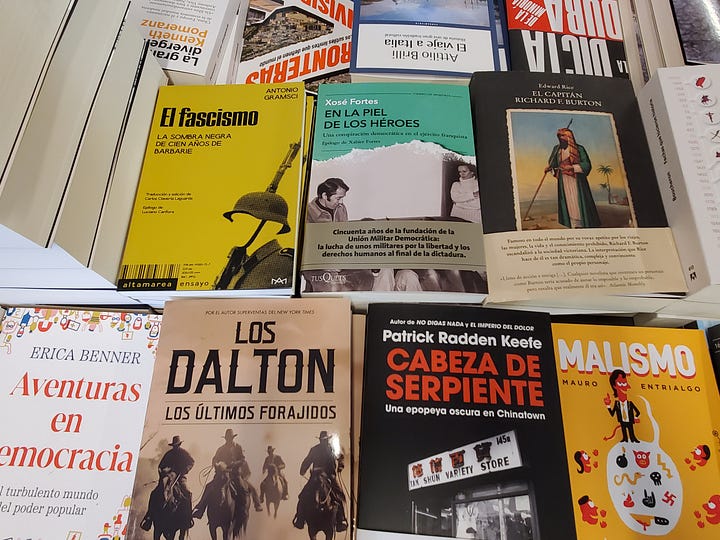
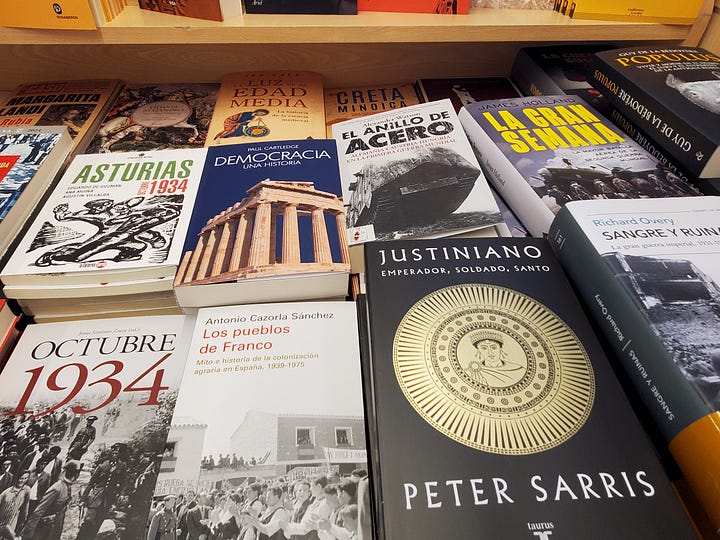
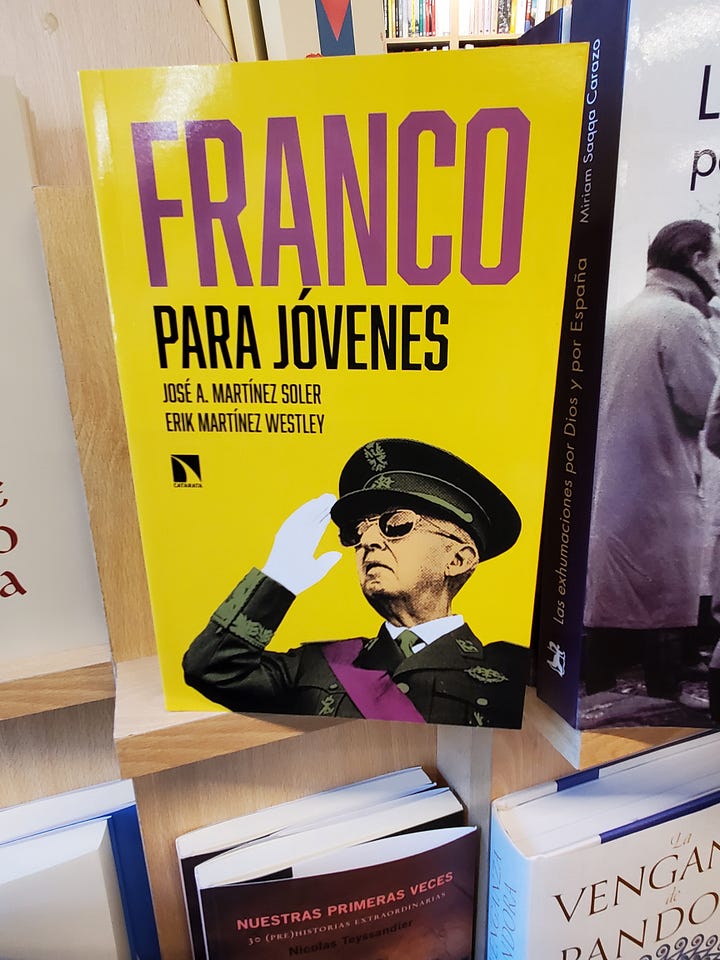
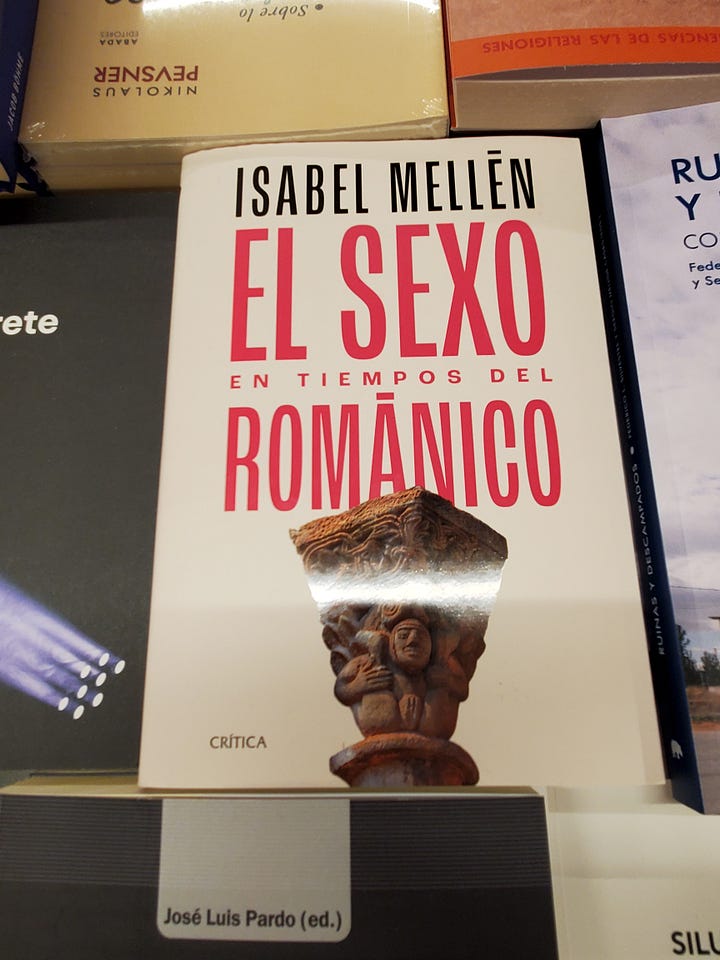
I ended up (yet again) in the cinema studies section and got this book on the director Ozu Yasujiro by the director Pablo García Canga:
Barcelona
Barcelona wasn’t very well-known outside of Spain until it hosted the Olympics in 1992, and then suddenly the city, its architect Antoni Gaudí, and his now famously unfinished basilica, La Sagrada Familia, all entered the public consciousness.
MUHBA
I’ve been to Barcelona twice this year—in spring and in autumn—and it now holds a special place in my heart. Barcelona survived despite decades of suppression during Franco’s fascist regime; while its rival, Madrid, was permitted to expand geographically and economically, Barcelona was intentionally suffocated through a mix of social and economic policies. Nevertheless, today it thrives, wonderfully weird and distinct, and it’s home to one of my favorite museums in the entire world, the trilingual Museu d'Història de Barcelona, or MUHBA.
MUHBA is a modest museum where the placards tell most of the story. Before you enter, you’ll read the above and be invited to walk past a thick curtain into blackness. When you emerge into the light on the other side, you’ll walk through the history of Barcelona—presented not as a simple, authoritative narrative, but as an exploration of the many “Barcelonas” that have existed over time. Maybe because of its history as an oppressed underdog, Barcelona articulates its own self-conceptualization with unusual poesy and boldness.
Anyway. All of this is to say: MUHBA has a great bookstore of literature in Spanish, Catalan, and English, featuring plenty of authors and poets from Barcelona.
You’ll never guess which section I ended up in, and what kind of books I got:
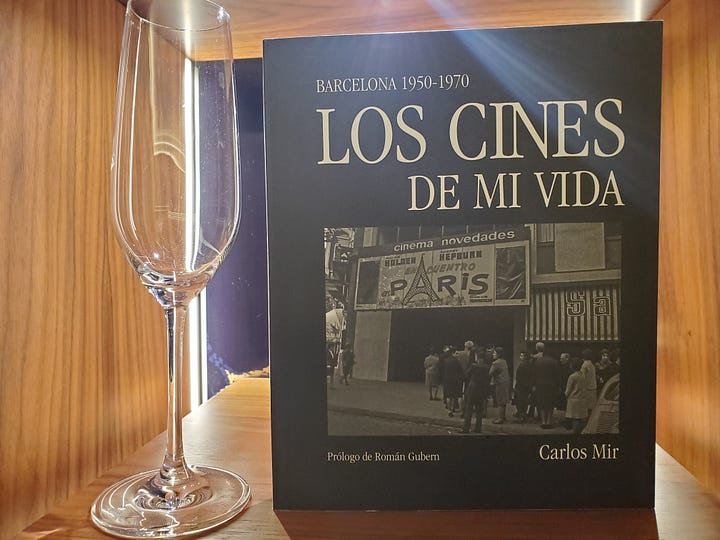
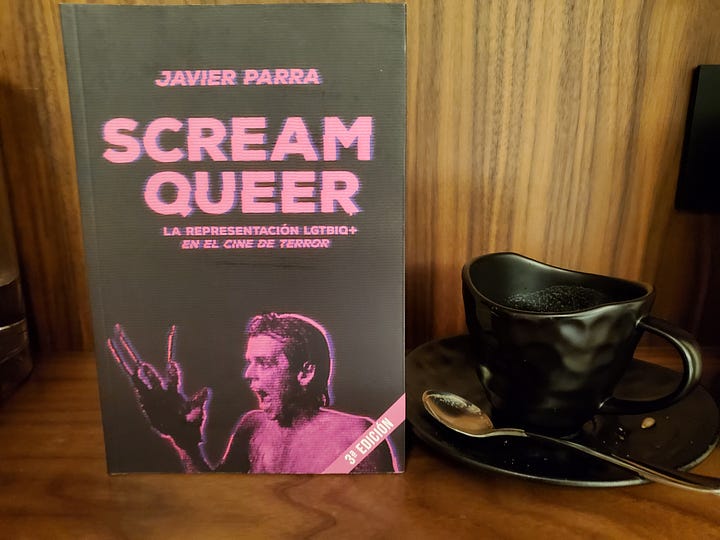
Los cines de mi vida is a walk through the now-vanished movie theatres Carlos Mir grew up with in 20th-century Barcelona. It’s a quirky memoir and reflection of a city as well as a thoughtful analysis of favorite classic films, and I really love it. I haven’t read Scream Queer yet.
Come in English Bookshop
If you’re wondering why I often get books on movies, it’s partly because I’ve found that, when learning languages, it’s easiest to read nonfiction books on topics you’re familiar with. So books on movies are accessible to me in Spanish in a way that, say, Cien años de soledad is not (yet).
But during my second trip to Spain, I felt famished for Spanish literature, and I would take it in-translation very happily. Come in English Bookshop came to the rescue:
I left the shop with:
A Short Account of the Destruction of the Indies by Bartolomé de las Casas (trans. Nigel Griffin)
Madrid Will Be Their Tomb by Elizabeth Duval (trans. Alice Banks)
An Englishman in Madrid by Eduardo Mendoza (trans. Nick Caistor)
Cathedral of the Sea by Ildefonso Falcones (trans. Nick Caistor)
The Shadow of the Wind by Carlos Ruiz Zafón (trans. Lucia Graves)
The Ornament of the World: How Muslims, Jews, and Christians Created a Culture of Tolerance in Medieval Spain by María Rosa Menocal, which has an editorial approach that made me feel physically ill when I read the note on it: It anglicizes names, so that Archbishop Raimundo becomes Archbishop Raymond. This book was published in 2002, so this is just a quick reminder of how far we’ve come, as I can’t imagine that editorial decision being made today (Raymond???).
Portugal: Madeira
Madeira is an outrageously beautiful Portuguese island that is closer to North Africa than the European mainland. If you visit, I recommend spending most of your time outside in awe of the flora and fauna. I visited twice this year, though, and the second time I escaped the heat by touring what I think is Portugal’s largest used bookstore.
Fundacao Livraria Esperanca
This three-floor shop looks like it was once a factory, maybe. It’s a tad labyrinthine the first time you walk through, but its most noteworthy feature is that the bookstore displays all of its books by cover.
Leave your precious bookstagram sensibilities at home: Here, books are brutally clipped to the wall, their prices scrolled inside.
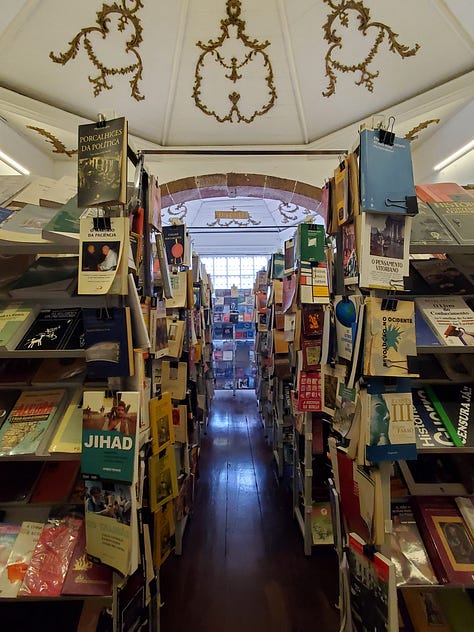


While I enjoyed looking at the romance section, the history books, and a section you’ll never guess (pictured below), I didn’t buy anything because I don’t know any Portuguese.
Nevertheless, I always find book browsing comforting—even when I can’t read the language.
So That’s a Wrap
If you made it this far, thank you for traveling (part of) the world of books with me. It really is a pleasure to see the diversity of indie bookshops, and I’m grateful to all of the bookstore owners and workers who were kind and helpful this year.
Until next time,
Hannah Varacalli
Copy & Developmental Editor
www.hveditorial.com

